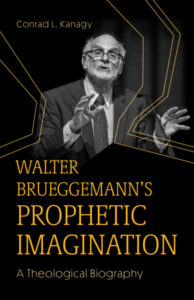 I hope you saw yesterday’s BookNotes review inviting you to pre-order the wonderful, forthcoming biography of Walter Brueggemann, Walter Brueggemann’s Prophetic Imagination: A Theological Biography by Conrad L. Kanagy. I did a good review of that exciting, soon-to-be-released book (please check it out HERE and share it if your so inclined.)
I hope you saw yesterday’s BookNotes review inviting you to pre-order the wonderful, forthcoming biography of Walter Brueggemann, Walter Brueggemann’s Prophetic Imagination: A Theological Biography by Conrad L. Kanagy. I did a good review of that exciting, soon-to-be-released book (please check it out HERE and share it if your so inclined.)
I promised a soon-to-follow “Reader’s Guide” to some of the many important books of Dr. Brueggemann. It took a lot of work, but here you go, my quick summary of the most important books by Walter Brueggemann. You might want to get a drink, maybe even a strong one, and settle in.
ALL OF THESE LISTED BELOW ARE 20% OFF — and some are discounted off already lower prices. Scroll down to the very end of the column to see our order form links where you can safely enter credit card info. We’ll send ’em out right away — or hold them until the forthcoming biography releases in mid-October, if you pre-order that. Just let us know how we can best serve you.
A (PARTIAL) READER’S GUIDE TO (SOME OF) THE BOOKS OF WALTER BRUEGGEMANN
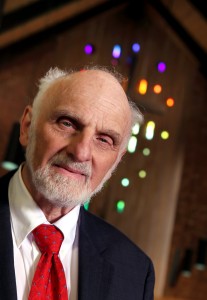 Brueggemann is allusive, evocative, charmingly good with words, one of the most interesting writers in the field of Biblical studies. He is, I think, theologically quirky. He is a poet, a man whose very rhetoric is deeply grounded in the cadences of the Biblical text, even though he has studied radical thinkers from Karl Marx to Paul Ricour. He notices things about the Bible — from the rhetoric to the political setting to the wit or sarcasm or exuberance in the original Hebrew. He preaches endlessly and so has, alongside producing oodles of serious scholarship, hefty theology, and academic commentaries, released tons of collections of essays, articles, speeches and sermons, some of them short and somewhat accessible. He even has several books of prayers, which are edgy, raw, provocative and yet often lovely. He has been writing since the mid 1970s and done nearly 100 books. I will group a handful of them under a few general categories or types.
Brueggemann is allusive, evocative, charmingly good with words, one of the most interesting writers in the field of Biblical studies. He is, I think, theologically quirky. He is a poet, a man whose very rhetoric is deeply grounded in the cadences of the Biblical text, even though he has studied radical thinkers from Karl Marx to Paul Ricour. He notices things about the Bible — from the rhetoric to the political setting to the wit or sarcasm or exuberance in the original Hebrew. He preaches endlessly and so has, alongside producing oodles of serious scholarship, hefty theology, and academic commentaries, released tons of collections of essays, articles, speeches and sermons, some of them short and somewhat accessible. He even has several books of prayers, which are edgy, raw, provocative and yet often lovely. He has been writing since the mid 1970s and done nearly 100 books. I will group a handful of them under a few general categories or types.
For what it is worth, Walter has himself named what he sees as his most important or seminal works in a few pages in the above mentioned forthcoming biography Walter Brueggemann’s Prophetic Imagination: A Theological Biography by Conrad L. Kanagy. I’m not going to argue. Or maybe I will…
START HERE: TEN GOOD INTRODUCTIONS
I’m just going to say it; Brueggey is an acquired taste. Some of passionate professor’s academic works, groundbreaking as they were, struck me as pretty technical and just too deep for nonprofessionals like me. There was a spark that one sometimes doesn’t see in such high-level technical scholarship, but still. I’ll name some of those shortly. But for beginners — or those who just don’t need the heavy stuff — here are six great collections that will introduce you to this master of the Biblical text, applied to contemporary society.
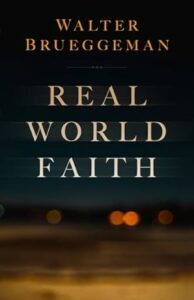 Real World Faith (Fortress Press) $24.95 OUR SALE PRICE = $19.96
Real World Faith (Fortress Press) $24.95 OUR SALE PRICE = $19.96
This is the newest such release, drawn from a series of blog posts Walter had done not long ago. It shows the urgency of Biblical texts to inspire contemporary prophetic imagination and “real faith for the realities of the world.” A bit personal and playful at times, expressing gratitude and tender care, it captures this wise, even eccentric, scholar weighing in on the world at large and his own thoughts as he enters his 90s. 31 entries in 250 pages. I’m really enjoying it and find so much already that I’ve shared with others. Excellent.
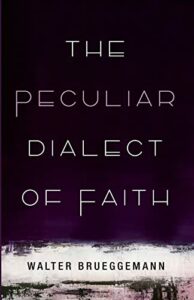 The Peculiar Dialect of Faith (Cascade) $19.00 OUR SALE PRICE = $15.20
The Peculiar Dialect of Faith (Cascade) $19.00 OUR SALE PRICE = $15.20
This is a shorter collection of perhaps more serious blog posts, relating to themes of “Biblical utterance” and his routine influences of “imaginative probes into the mystery of God’s creation and into the hidden complexities of human hurt and human hurt.” The rhetoric of the Bible is always relational, which itself critiques the modern styles of discourse. Old Testament prof Rolf Jacobson calls it “quintessential Brueggemann!” Kathleen O’Connor says that these luminous essays illustrated why he is esteemed as a singular wordsmith.
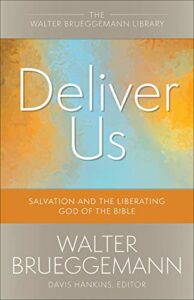 Deliver Us: Salvation and the Liberating God of the Bible (WJK) $20.00 OUR SALE PRICE = $16.00
Deliver Us: Salvation and the Liberating God of the Bible (WJK) $20.00 OUR SALE PRICE = $16.00
This is one of three currently available anthologies grouped by topic, published as “The Walter Brueggemann Library.” Black preacher and activist Jacqui Lewis says, “You will need this on your shelf.” She is right. In these dark times, this starts with the narratives of liberation in Exodus which illustrates much, so much. Some of these chapters are themselves worth the price of the book. And there are good reflection questions to help you process it, or, better, to use it as a small-group read.
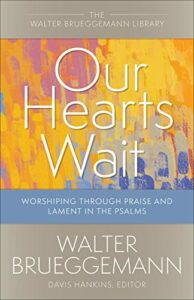 Our Hearts Wait: Worshiping Through Praise and Lament in the Psalms (WJK) $20.00 OUR SALE PRICE = $16.00
Our Hearts Wait: Worshiping Through Praise and Lament in the Psalms (WJK) $20.00 OUR SALE PRICE = $16.00
Again, this is a wonderful new collection as part of the themed studies brought together as “The Walter Brueggemann Library.” I suppose you know that Brueggemann has done exceptional work on the Psalms and this brings together some of his seminal essays, journal articles, chapters from various books. Good discussion questions make it useful for a small group read. If you’re interested, I think this is a must.
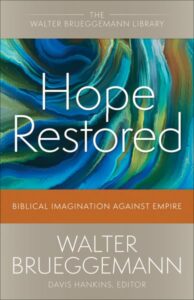 Hope Restored: Biblical Imagination Against Empire (WJK) $20.00 OUR SALE PRICE = $16.00
Hope Restored: Biblical Imagination Against Empire (WJK) $20.00 OUR SALE PRICE = $16.00
Oh my, what can I say? This is perhaps one of the very best ways into the oeuvre of Dr. Brueggemann and, yet, an inspiring refresher course for those who have read much of his work. There are good chapters from an early book on the Old Testament and a rare journal article for preachers. There are some pieces from his small book on the prophets and a bit from Hope Within History, a personal favorite, if older. Very interesting; urgent, even. Good discussion questions. Highly recommended.
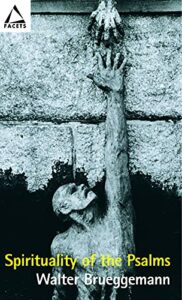 Spirituality of the Psalms (Fortress) $11.99 OUR SALE PRICE = $9.59
Spirituality of the Psalms (Fortress) $11.99 OUR SALE PRICE = $9.59
Below you will see our listing of two other classic works on the Psalms. This mass-market sized, small book in the “Facets” series offers brief and brilliant treatments, in this case, a concise summary of much of Walter’s passion for reading, praying, and living the Psalter.
In the first chapter, he writes:
“The life of faith expressed in the Psalms is focused on the two decisive moves of faith that are always underway by which we are regularly surprised and which we regularly resist: out of a settled orientation into a season of disorientation, and from a context of disorientation to a new orientation, surprised by a new gift from God, a new coherence made present to us just when we thought all was lost.”
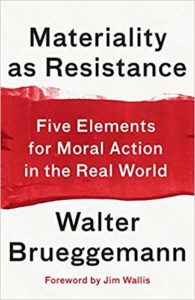 Materiality as Resistance: Five Elements for Moral Action in the Real World (WJK) $18.00 OUR SALE PRICE = $14.40
Materiality as Resistance: Five Elements for Moral Action in the Real World (WJK) $18.00 OUR SALE PRICE = $14.40
This is one of the shorter books Walter has done and there are questions for discussion and reflection following each of these five chapters. What is materiality? You know, stuff. There is no hard dichotomy in the Scriptures between the seemingly sacred and secular, and ordinary stuff and how we use it is critical. The subtitle is clear: this is about nurturing moral active and public ethics for living in the real world. He is evocative and has scholarly footnotes, but this is ideal for those wanting to see the social implications for Biblical faith. He looks at food, money, the body, time, and place and asks how our faith influences our stewardship of these opportunities. One reviewer said this is a succinct manifesto of Brueggemann’s most important work. Jim Wallis has a lengthy forward called “A Compelling Worldly Faith.”
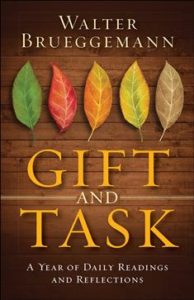 Gift and Task: A Year of Daily Readings and Reflections (WJK) $30.00 OUR SALE PRICE = $24.00
Gift and Task: A Year of Daily Readings and Reflections (WJK) $30.00 OUR SALE PRICE = $24.00
When this came out a few years ago — following the liturgical assignments for Year B — many were thrilled. Of course, it can be used any year, and in Gift and Task Brueggemann gives us a full year’s worth of daily readings, reflections on the texts of the day. I cannot believe this book isn’t better known among us and used rigorously. What a gift.
There is probably no single Scripture scholar whom I would sooner endorse or want to thank than Walter Brueggemann. He has not only introduced us to the courage and importance of the biblical prophets but has also turned out to be one himself. Western culture needs his prophecy now. — Richard Rohr, OFM – The Center for Action and Contemplation
 A Wilderness Zone (Cascade) $23.00 OUR SALE PRICE = $18.40
A Wilderness Zone (Cascade) $23.00 OUR SALE PRICE = $18.40
There are so many collections and anthologies of Walter’s many, many essays and articles, but this recent one seems really helpful, locating, as he does, his faith and Biblical work in the middle of current socio-political issues and cultural trends. Here is how he puts it:
In these several pieces I have worked to trace out possible interfaces between specific scripture references and matters at the forefront of our common social life. It is my hunch that, almost without fail, such an interface creates a very different angle of vision for any element of our common social life, because it situates such a topic in the context of the biblical narrative that is occupied by the holy agency of God. Such an alternative angle of vision helps to defamiliarize us from our usual discernment according to the master narrative of democratic capitalism that is most widely shared across the spectrum of conservatives and progressives. Because our common angle of vision shared by progressives and conservatives has a very low ceiling of human ultimacy, we (all of us!) easily come to think that our particular reading of social reality is absolute and beyond question, even if dominated by a tacit ideology. It is my bet that an interface with biblical testimony can and will de-absolutize our excessive certitude and permit us to look again at the social “facts” that are in front of us. I do not think and do not suggest that such interfaces with scripture are inevitable; they are rather suggestive, impressionistic, and fleeting, the kind of linkage that is available in the matrix of faith that is not fixed on certitude.
Simply put, we have no one like Walter Brueggemann. . . . Here, he outpaces all others once again, amazes us once more, as he ranges easily across the full span of Christian Scripture with not-infrequent, equally dexterous engagements with economic and political theory, race relations, philosophy, liberation, migration, and much, much more. And so, again, I repeat: we have none like Walter. Take and read!” — Brent A. Strawn, Duke University, author, The Incomparable God: Readings in Biblical Theology
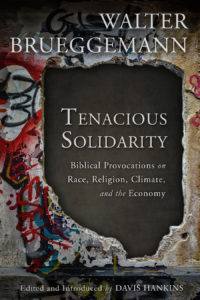 Tenacious Solidarity: Biblical Provocations on Race, Religion, Climate, and the Economy (Fortress Press) $29.00 OUR SALE PRICE = $23.20
Tenacious Solidarity: Biblical Provocations on Race, Religion, Climate, and the Economy (Fortress Press) $29.00 OUR SALE PRICE = $23.20
I wasn’t sure where to list this one — it’s hefty — but it is an excellent, thick example of how Walter allows the Bible to speak into, in often surprising ways, the most contemporary themes and topics of contemporary culture. As the lengthy and excellent introduction by editor David Hankins puts it, Brueggemann excels at undermining those who want to somehow separate dispassionate Biblical scholarship and contemporary ethical pronouncements. Brueggemann always reads with this kind of trajectory and so these essays are compiled from fairly recent talks, sermons, essays, and presentations among groups of Bible scholars, laypeople, activists, and others.
It is a big book and some of the pieces are somewhat demanding. Yet, it is Brueggemann at his best, exploring the Biblical text, evoking connections that resonate, drawing implications by listening well to the voice of the text, sacred Scripture that it is, and putting it into context with the daily news, contemporary (or older) secular scholars, the latest headlines.
Here’s how others explain how important it is:
With his characteristic skill and wisdom, Walter Brueggemann demonstrates again in this collection of recent essays the generative and transformative potentials of biblical texts to name and confront urgent challenges of our time. His interpretations model a compelling dialogue between biblical texts, interdisciplinary scholarship, and incisive, contemporary social, political, and economic analyses. The result utterly captures the imagination and urges and inspires the building of a far more welcoming, forgiving, generous, and sustainable future together. — Christine Roy Yoder, Columbia Theological Seminary
I was taught to preach with the Bible in one hand and the newspaper in the other. It was faithful advice. Of course, there are times (like now) when a steady tide of distressing newspaper headlines can overwhelm even the most biblically savvy of preachers. Do not fear, says Walter Brueggemann, pointing calmly to the book in our other hand. Tenacious Solidarity is unmatched in rifling through Scripture’s pages and finding there wisdom and courage for the living of these days. –Scott Black Johnston, pastor of Fifth Avenue Presbyterian Church
BASIC TOOLS TO HELP YOU UNDERSTAND THE BIBLE
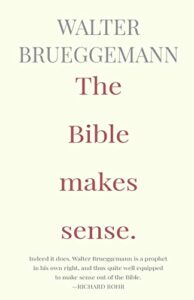 The Bible Makes Sense (Franciscan Media) $15.99 OUR SALE PRICE = $12.79
The Bible Makes Sense (Franciscan Media) $15.99 OUR SALE PRICE = $12.79
This was a small, early book that has been released by several different publishing houses; it is magnificent, even if provocative at times. It insists that the Bible cannot be co-opted or read properly through the lease of the classic cultural left or right; it is beyond social liberalism or cultural conservatism and wants to have us enter its world and listen to it’s strange cadences of a unfolding story that brings hope and new ways to imagine the world. (Actually he critiques what he describes as the “The Modern-Industrial-Scientific Model,” “The Existentialist Model,” and “The Transcendentalist Model,”offering instead am “Historical-Covenantal” approach. Eight or nine chapters and a summarizing piece at the end.
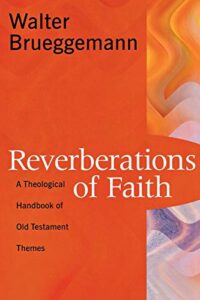 Reverberations of Faith: A Theological Handbook of Old Testament Themes (WJK) $30.00 OUR SALE PRICE = $24.00 (This is a limited time, special sale price; new copies will come in at $49.00. Get them at this cheaper price, only while supplies last.)
Reverberations of Faith: A Theological Handbook of Old Testament Themes (WJK) $30.00 OUR SALE PRICE = $24.00 (This is a limited time, special sale price; new copies will come in at $49.00. Get them at this cheaper price, only while supplies last.)
This is literally a handbook, a set of over 100 A to Z entries explaining words, people, places, ideas, and themes. This is what one reviewed called “a theological jewel” and often shows the deep interconnection of these various words and places and notions. I refer to it often and sometimes it is a tad puzzling. Other times it is nothing short of brilliant. It is always useful. This is fantastic.
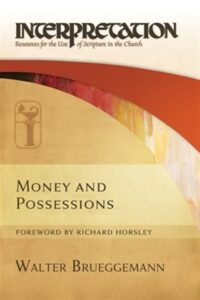 Money and Possessions (Interpretations) (WJK) $50.00 OUR SALE PRICE = $40.00
Money and Possessions (Interpretations) (WJK) $50.00 OUR SALE PRICE = $40.00
You may know the Interpretation Bible commentaries (Brueggemann did two of them, actually, on Genesis and on both books of Chronicles.) They are critical, serious, but readable, designed for preachers and teachers. Some are better than others.
In any case, in the spirit of that series, they expanded the brand to include major mainline denominational scholars weighing in on key themes and topics. Those are all very useful and none more than this one on economics. This big whopper of a volume is, in Brueggemann’s own estimation (or so he told Conrad Kanagy when he asked) one of the most important volumes he ever wrote, a classic example of what he hopes to do as he unleashes the complicated teachings in the Bible about a topic for today. There is a whole lot in Holy Scriptures about money and possessions and while others have tried, nobody has documented all this content in one provocative volume. Almost 345 awesome pages.
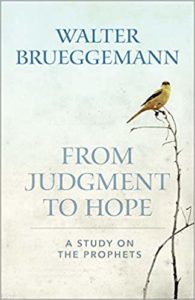 From Judgment to Hope: A Study on the Prophets (WJK) $17.00 OUR SALE PRICE = $13.60
From Judgment to Hope: A Study on the Prophets (WJK) $17.00 OUR SALE PRICE = $13.60
This is almost a little handbook, a brief introduction to each of the prophets, major and minor. He explains the complicated socio-political contexts — the setting of North or South in the divided Kingdom, the threat from Assyria, the post-exilic preachers in Babylon, etc. — and is as succinct as any little such book I know. Nicely done. 120 pages.
 The Land: Place as Gift, Promise, and Challenge in Biblical Faith (Fortress) $29.00 OUR SALE PRICE = $23.20
The Land: Place as Gift, Promise, and Challenge in Biblical Faith (Fortress) $29.00 OUR SALE PRICE = $23.20
I’ve mentioned in my comments on Kanagy’s book, above, that this was the first Brueggemann book I ever read – thanks to Peter J. Steen! — and I’ll admit it was above me at the time. Still, it is not one of his most rigorous, but a moderately academic, a serious but readable study of land and place, throughout the Bible, Known, of course, as an Old Testament scholar, he does here push into New Testament content a bit as well. It is magnificent and nearly majestical, a theme within the Biblical literature that if you don’t understand it, you will fail to be fully grasped by the Kingdom vision of the Scriptures. He was one of the first Biblical scholars to draw on Wendell Berry, too, so there’s that. I wish he had attended to Revelation 21 and 22…
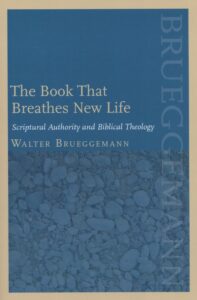 The Book That Breathes New Life: Spiritual Authority and Biblical Theology (Fortress) $25.00 OUR SALE PRICE = $20.00 (This is a limited time, special sale price of the hardbacks prices [regularly $35.00] at the cheaper paperback price. Get them at this cheaper price, only while supplies last.)
The Book That Breathes New Life: Spiritual Authority and Biblical Theology (Fortress) $25.00 OUR SALE PRICE = $20.00 (This is a limited time, special sale price of the hardbacks prices [regularly $35.00] at the cheaper paperback price. Get them at this cheaper price, only while supplies last.)
This is a part of a trio of handsome hardbacks that Fortress did years ago and while it my not be my favorite book about the authority of Scriptures, it is one of the helpful resources to show what Brueggemann thinks. I recall years ago when a strict evangelical (whose views of the Bible I mostly agreed with) express disapproval about Brueggemann’s liberal views. I thought of the parable Jesus told of the one boy who said he would do the bidding of the father, but did not. The other boy said he refused, but did obey. There are bunches of authors who have written about inerrancy and the battles for the Bible and calling us to know and live the Scriptures, but they don’t really do it faithfully themselves and frankly just bore me. And there are those like Brueggemann who will quip, about a Psalm or prophetic utterance, “But, ya know, it’s just a poem.” And then he invites you to stake your very life on it. This book collects some of his academic pieces about how God speaks through these contested texts of sacred Scripture and where he places himself along with other giants of 20th century Biblical scholarship.
By the way, a fun piece making this interesting for some of our readers: years ago our friend J. Richard Middleton (who has gone on to publisher stellar, groundbreaking books) politely disagreed with Brueggemann about something he wrote, and ended up doing an article in the Harvard Theological Review. Brueggemann ended up mostly agreeing with young Richard and his response to the piece is offered here, entitled “Israel’s Creation Faith: Response to J. Richard Middleton.” He has some others pieces about Von Rad and about Brevard Childs, (of course he does) but for some of us, the Middleton response will be the first chapter we read.
A FEW ESSENTIAL SHORTER WORKS ON BOOKS OF THE BIBLE OR THEMES
Listen carefully. A few of these are rigorous, demanding, paradigm shifting. A few are less academic and good for groups. I’ll try to explain which are which. This short list only names few of his many important books, including full commentaries on Genesis, Deuteronomy, Isaiah, Jeremiah, Psalms, and more. (I’m not even going to list those, but we’ve got ‘em.) Here are a few of my favs.
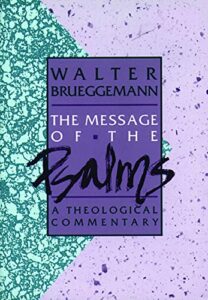 The Message of the Psalms: A Theological Commentary (Fortress) $19.00 OUR SALE PRICE = $15.20
The Message of the Psalms: A Theological Commentary (Fortress) $19.00 OUR SALE PRICE = $15.20
This introduces the notion that there are essentially three kinds of Psalms, poems of what he calls “Orientation” (where God is in heaven, Jerusalem is upheld, and all is right with the world), psalms of “Disorientation” (where exile is threatened or sin has overwhelmed and things are dark. These are mostly laments, a genre he helped recover in our lifetime) and “Re-orientation” where, after exile or sin, things are re-covered, but perhaps with greater sobriety. God reigns, grace abounds, but they know, now, what has happened. This threefold schema has been the most generative insight about any part of the Old Testament that I think has been uncovered in the last 50 years at least. That is parallels the grand story of creation – fall – redemption is not lost on him or others. This, in a nutshell, is the way to sing and pray and reflect on the realty, grief, and hope of our lives.
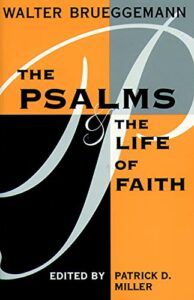 The Psalms and the Life of Faith (Fortress) $29.00 OUR SALE PRICE = $23.30
The Psalms and the Life of Faith (Fortress) $29.00 OUR SALE PRICE = $23.30
This is a collection edited by Patrick Miller of some of Brueggemann’s best scholarly work on the Psalms and I know important Christian thinkers and leaders who say this is one of the best things they’ve ever read of his. As Brueggemann points out, when these Psalms are proclaimed, they make claims about reality (and, as Miller writes, “they shape reality in ways more potent and shocking that we usually realize.”) This study of the use of the Psalms by the church and what we might recover in using them more wisely is simply one of the best resources on this stuff written in our times.
 From Whom No Secrets Are Hid: Introducing the Psalms (WJK) $30.00 OUR SALE PRICE = $24.00
From Whom No Secrets Are Hid: Introducing the Psalms (WJK) $30.00 OUR SALE PRICE = $24.00
Edited by Brent Strawn, an OT professor from Candler and increasingly known as a Brueggemann protege and spokesperson in his own right, this volume in a sense represents the later insights and teachings about the Psalms, a culmination of years of research and preaching. He looks at some lesser known Psalms and makes available fresh visions of praise and re-orientation for ordinary church leaders. (One reviewer from Baylor University notes that “the articulation of the world envisions by the Psalms and its challenge to our world in chapter 2 of the book are alone worth the price of book!) You could say that about a number of this brilliant, readable, pieces.
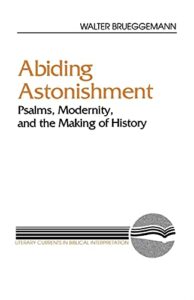 Abiding Astonishment: Psalms, Modernity, and the Making of History (WJK) $14.95 OUR SALE PRICE = $11.69 This is a limited time, special sale price; new copies will come in at $22.00. Get them at this cheaper price, only while supplies last.
Abiding Astonishment: Psalms, Modernity, and the Making of History (WJK) $14.95 OUR SALE PRICE = $11.69 This is a limited time, special sale price; new copies will come in at $22.00. Get them at this cheaper price, only while supplies last.
I’m not even sure if this is still in print but we have a bunch, delighted to name it now as a volume in the old “Literary Currents in Biblical Interpretation” series. It is thin, academic, and an amazing survey (if you stick with it) about this trend in understanding the role of rhetoric and utterance and praise in the Scriptures. The title itself is so quintessentially Brueggemann and indicates what you’ll get in on if you join him in this little study.
For what it is worth, this is a short but rigorous study of what is called the “Psalms of Historical Recital” (which is to say Psalm 78, 105, 106, and 136) where Brueggemann considers what these pslams are saying on their own terms and how their truths stand in contrast to the making of modernity and the values of our own age. Wow.
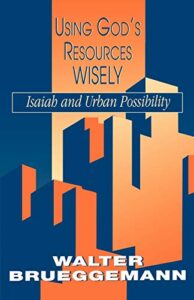 Using God’s Resources Wisely: Isaiah and Urban Possibility (WJK) $14.95 OUR SALE PRICE = $11.69 This is a limited time, special sale price; new copies will come in at $17.00. Get them at this cheaper price, only while supplies last.
Using God’s Resources Wisely: Isaiah and Urban Possibility (WJK) $14.95 OUR SALE PRICE = $11.69 This is a limited time, special sale price; new copies will come in at $17.00. Get them at this cheaper price, only while supplies last.
This is a slim book that packs a wallop, that is full of promise and hope even as it looks at injustice and exploitation (as described so vividly in the book of Isaiah.) Yet, there is a restoration afoot and God’s call is to live into a wise stewardship of our resources. This book was exceedingly good when it came out — they were first given as talks to Presbyterian Women in the very early 1990s — and in his preaching about the urban crisis and the ecological crisis he was breathtakingly prescient. This book could be read more profitably today than then, and it was very good, then. He uses the provocative phrase of some of Isaiah being an artistic-theological history of the city of Jerusalem” and thereby a case study in an urban environmental crisis. Highly recommneded.
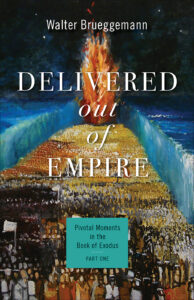 Delivered Out of Empire: Pivotal Moments in the Book of Exodus – Part One (WJK) $19.00 OUR SALE PRICE = $15.20
Delivered Out of Empire: Pivotal Moments in the Book of Exodus – Part One (WJK) $19.00 OUR SALE PRICE = $15.20
I hope you recall our review of this in a previous BookNotes a year or so ago. It is a reader-friendly study of the Book of Exodus with a eye to the pivot points on which the text shifts and the story deepens or changes. What a great way to study these rhetorical points in the story and the great moments that come alive in his vivid storytelling and astute scholarly look. Great study questions, too, make this ideal for small groups.
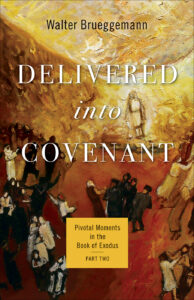 Delivered into Covenant: Pivotal Moments in the Book of Exodus – Part Two (WJK) $19.00 OUR SALE PRICE = $15.20
Delivered into Covenant: Pivotal Moments in the Book of Exodus – Part Two (WJK) $19.00 OUR SALE PRICE = $15.20
Yep, Part Two, picking up at Exodus 16:10. Brueggemann has spent his life studying these texts and it is so good to reflect with him on how the story unfolds and what it might mean for us today.
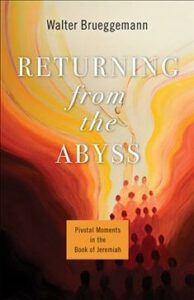 Returning from the Abyss: Pivotal Moments in the Book of Jeremiah (WJK) $19.00 OUR SALE PRICE = $15.20
Returning from the Abyss: Pivotal Moments in the Book of Jeremiah (WJK) $19.00 OUR SALE PRICE = $15.20
Using the same insightful and user-friendly sort of approach as in the two-part Exodus study (above) he here parlays his life-long study of and preaching on Jeremiah into this adult study (27 chapters) of key texts in the book where things pivot or become vital or clearer. These shifts make a world of difference, sometimes 9and sometimes only are obvious to the reader who is paying close attention.) Simply amazing. There is nothing like this and I hope the editor (Brueggemann protege Brent Strawn) finds others to do more in this “Pivotal Moments in the Old Testament” series.
MID-LEVEL THEMATIC WORKS OF GREAT IMPORTANCE
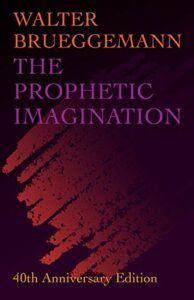 The Prophetic Imagination (Fortress) $21.00 OUR SALE PRICE = $16.80
The Prophetic Imagination (Fortress) $21.00 OUR SALE PRICE = $16.80
Oh my, so, again, this is the one to read. I think it was my third time through that I began to “get it” and that was after I heard him so I had learned to slow drawn, draw out the words the way he does, and take it in slowly. I came to understand a bit of this powerful insight about the pathos of sorrow — breaking through the denial — that the great prophets had (from Moses to Jeremiah to Jesus) and how tears, therefore, are subversive. (I”ll admit, my friends Brian Walsh and Richard Middleton helped me immensely in the second half of their vital Truth Is Stranger Than It Used To Be as they countered the postmodern incredulity towards meta narratives with a Brueggemann-esque reply that in this meta narrative, the leading character suffers and dies. It is not an oppressive totalizing narrative, but an upside down one and therein lies its power to stand against a “royal consciousness.” Tears are subversive! I bet ya didn’t see that coming?
As I know you know, this kind of “prophetic imagination” is not about predicting the future nor is it mostly about advocating for lefty social justice issues, but is a deeper matter. One of the top few books I’ve ever read, even though it took me a bit, and I’m still processing it all. Kanagy’s biography is right, it is, in many ways, his signature book and an apt description of Walter’s gift to the church.
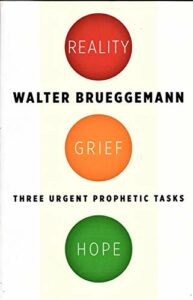 Reality, Grief, Hope: Three Urgent Prophetic Tasks (Eerdmans) $16.99 OUR SALE PRICE = $13.59
Reality, Grief, Hope: Three Urgent Prophetic Tasks (Eerdmans) $16.99 OUR SALE PRICE = $13.59
I think this is one of the most under-appreciated books in Brueggemann’s huge library. It is, or so he says, the long-awaited sequel to The Prophetic Imagination. Naturally, much revolves — like all the prophetic literature — around the destruction of Jerusalem in 587 BC. The prophets either were fighting the denial (the Hebrews assuming they were GOd’s people and nothing truly bad would happen to them) or they were in despair in exile, wondering if they could ever be loved by God again. Breaking through despair and denial takes a sturdy grasp of the really real, an honest and compelling practice of lament, and the prophetic gift of the hopeful imagination. After the 9/11 attacks, Brueggemann’s handy schema of the importance of 587 BC became palpable for many of us. This book is, literally, about having a prophetic imagination.
As Shane Claiborne, author and activist puts it:
Walter Brueggemann is a legend. . . . With typical Brueggemann brilliance, here he brings the prophets of old into the contemporary world and dares us to look through their eyes. If you love Walter, you’ll love this. If you’ve never heard of him, get ready to get hooked.
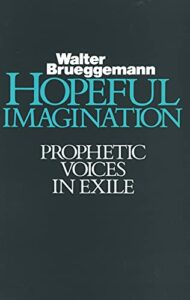 Hopeful Imagination: Prophetic Voices in Exile (Fortress) $29.00 OUR SALE PRICE = $23.20
Hopeful Imagination: Prophetic Voices in Exile (Fortress) $29.00 OUR SALE PRICE = $23.20
I always counted this as the sequel to Hopeful Imagination and to this day it has the same cover design as did the original version of Prophetic Imagination. So it is a companion to that groundbreaking book (even if Reality Grief and Hope was later designated as the official follow up.) It is a great, serious read.
I tell customers that if they appreciated Prophetic Imagination then this is a natural next read, asking the same question: how did these prophets of hope and new energy have the audacity to conjure up such claims? Go back to Israel during the most sour years of captivity, when Israel had been decimated and the temple destroyed? Build a highway through the desert for God’s sake? Where did these kind of dreamers come from? I loved this taut, serious, study of the post-exilic prophets, among others.
This description I found somewhere is a bit clunky as formal prose but it explains the book well:
Professor Brueggemann here examines the literature and experience of an era in which Israel’s prophets faced the pastoral responsibility of helping people to enter into exile, to be in exile, and to depart out of exile. He addresses three major prophetic traditions: Jeremiah (the pathos of God), Ezekiel (the holiness of God), and 2 Isaiah (the newness of God). This literature is seen to contain the theological resources for handling both brokenness and surprise with freedom, courage, and imagination. Throughout, Brueggemann demonstrates how these resources offer vitality for ministry today.
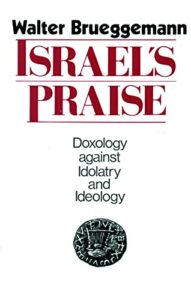 Israel’s Praise: Doxology Against Idolatry and Ideology (Fortress) $26.00 OUR SALE PRICE = $20.80
Israel’s Praise: Doxology Against Idolatry and Ideology (Fortress) $26.00 OUR SALE PRICE = $20.80
It took me years to squeeze in various Brueggemann books; as much as I liked him, and as valuable as the books were (and as many tapes as I listened to) as I was still a novice. Somewhere, years ago, long after this 1988 book was released, I tackled it in earnest and I will never forget how the “lights came on” as I realized, through Brueggemann’s expert analysis, that some praises in the Bible were illegitimate; some were idolatrous, and sometimes what we casually cite as beautiful, sweet passages, are, in fact, in context, wicked. They gave voice to a priveledged royal consciousness that was aligned with the ruling empire — think of our own beloved patriotic songs (and Jimi Hendrix’s subversive deconstruction, as a black man, playing the “Star Spangled Banner” in an electric, fuzzy blues version at Woodstock, understood, by some, as protest and resistance.) Yes, praise is our duty and delight but what if praise is misguided? Or used against the idols? Can true doxology unmask and resist false ideologies? What are the differences in the point and theology of the royal enthronement Psalms, say, the the liberative messages “from below” that come from, say, Exodus or the second part of Isaiah?
This is beautiful, heavy stuff on praise, yes, but also an astute critical assessment of how the Bible has more than one voice, and some parts, even praises, may be counter to the true God of redemption. Wow. Let this sink in.
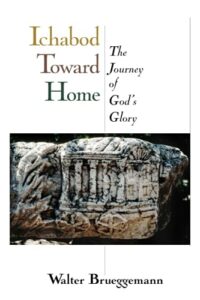 Ichabod Toward Home: The Journey of God’s Glory (Eerdmans / Wipf & Stock) $19.00 OUR SALE PRICE = $15.20
Ichabod Toward Home: The Journey of God’s Glory (Eerdmans / Wipf & Stock) $19.00 OUR SALE PRICE = $15.20
First done by Eerdmans, I am grateful that this publisher reissued it. It is a fascinating study of 1 Samuel 4 – 6. (He has deeper more systematic commentaries on some of the historical books.) In this dramatic section, we have the famous story of the ark of the covenant being captures by the Philistines (but finally returned to Israel.) God’s glory with them, gone, and returned. (Creation-fall-redemption? The three-day story of Christ alive, dead, and resurrected?) This ancient story has, Brueggemann shows, profound relevance for nurturing images of faith and for our social lives today.
In a fascinating gesture not uncommon in Brueggemann’s studies, he compares all this to the modern consumer three day weekend and shifts to how this rendering of God’s glory and the Ark narratives contrast (“contradicts”) the dominant narrative of our own culture “with our strident emphasis on self-indulgence, narcissism, and self-sufficiency.”
As the back cover puts it, “In looking anew at what this story reveals about God’s glory — or kabob, from which the name Ichabod derives — Brueggemann builds a powerful new theology of God’s sovereignty.”
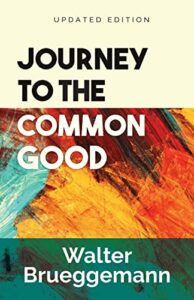 Journey to the Common Good (WJK) $20.00 OUR SALE PRICE = $16.00
Journey to the Common Good (WJK) $20.00 OUR SALE PRICE = $16.00
I had nearly worn out my cassettes of these brilliant lectures offered Regent College in British Columbia when the first edition of the book came out in 2010. Then, after the killing of George Floyd, Brueggemann wrote a new chapter, re-introducing the themes of these lectures that were offered there at the thoughtful evangelical graduate school in Vancouver. I would say this is one of the truly great Brueggemann books, bringing his years of serious study to fruition in lively lectures, provocative and deeply Biblical, pushing his listeners to greater faithful engagement.
In the lectures, as is the won’t of Regent, they had their own staff reply and respond, and Brueggemann, in the cassette tapes, replied to their good feedback. I wish that were in the book. Still, this is a masterpiece of a little book, three major lectures. Here are the titles of each chapter:
- The Journey to the Common Good: Faith, Anxiety, and the Practice of Neighborliness
- The Continuing Subversion of Alternative Possibility: From Sinai to Current Covenanting
- From Vision to Imperative: The Work of Reconstructing
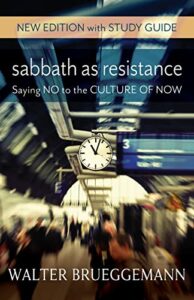 Sabbath as Resistance: Saying No to the Culture of Now (WJK) $18.00 OUR SALE PRICE = $14.40
Sabbath as Resistance: Saying No to the Culture of Now (WJK) $18.00 OUR SALE PRICE = $14.40
I suppose this is not his deepest scholarship but it truly brings together themes he has written bout often and spoken of in workshops I’ve heard for decades. It is Walter that first pointed out to me (I’m dense, okay?) that in the two tellings of the 10 commandments and the mandate to keep sabbath, one is given with the reasoning because of the creation mandate: God rested on the seventh day, so we should, too, image bearers that we are. The other recording of the Ten Words comes, however, with a different prelude, offering a different rational, It is because “you” were once slaves in Egypt, at the whims of the Pharaohs brick quotas, the ever increasing workload. “You don’t have to live like that!” I have heard Walter insist, with such passion that I will never, ever forget it. Sabbath as Resistance draws on this subversive logic of God to resist the oppression of the overlords, the consumer culture, the capitalist systems, inciting that we can resist all of that with this simple Biblical command.
The new edition has a good study guide and it makes a great book club title, useful for adult Sunday school classes or Bible study groups. There are six good chapters, each with a different Biblical text. Nice.
Publishers Weekly called this “concise but significant.” Indeed.
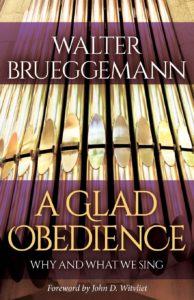 A Glad Obedience: Why and What We Sing (WJK) $22.00 OUR SALE PRICE = $17.60
A Glad Obedience: Why and What We Sing (WJK) $22.00 OUR SALE PRICE = $17.60
I can hardly say how great this is and I could go on and on naming groups that might read it together. The choir in a mainline church? The praise team at your mailing church? Your worship band at your evangelical mega-church? The book club at the senior center where surely folks still remember the old hymns? With a foreword by John Witvliet, you know it’s solid, good stuff.
The first part of this — four solid chapters — are under the rubric of “Why We Sing” and it his unique take on four different Pslams (104, 107, 105, and 106.)
Part Two is “What We Sing” and there are about 15 reflections — with his prophetic imagination attuned and his deep Biblical worldview functioning well — on various sorts of songs, hymns, and old gospel tunes. He loves this stuff and if you read his biography you’ll be reminded of how much a conventional church guy he really is. I love this book, and I think of the elders in my own family and my wife’s family who lived as much by the hymnbook as anything. There is nothing quite like this on the market and I do highly recommend it for those who want his deeper, evocative language in conversation with Psalms and hymns to recover what Luke Powery calls “our primary doxological vocation.”
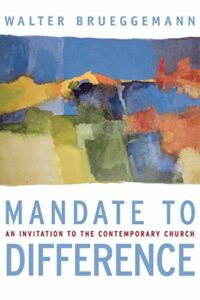 A Mandate to Difference: An Invitation to the Contemporary Church (WJK) $20.00 OUR SALE PRICE = $16.00 This is a limited time, special sale price; new copies will come in at $30.00. Get them at this cheaper price, only while supplies last.
A Mandate to Difference: An Invitation to the Contemporary Church (WJK) $20.00 OUR SALE PRICE = $16.00 This is a limited time, special sale price; new copies will come in at $30.00. Get them at this cheaper price, only while supplies last.
This is one of those often-missed Brueggemann books which is a collection of heady papers, challenging sermons, provocative messages, and inspiring lectures given — mostly circa 2005 — that in one way or another related to the life of the local church. These are serious lectures and papers (or typical Brueggemann-esque sermons) on ministry, urban mission, sabbath, congregational identity, conflict, worship, ministry. They hang together, more or less, and are all deep in the Biblical literature, explicating the extraordinary insights Brueggemann gets from pondering our primary texts.
As he reminds us so often, “our faith is not about pinning down moral certitude’s. It is, rather, about openness to wonder and aw in glad praise.” Can this habit and practice — doxology — allow us to “courageously defy political polarization, consumerism, even militarism” in our churches? Can our church’s push us into the world not with fearful anxiety but as peacemakers in the culture? This book seems to me to have been maybe 20 years ahead of its time. Get it today!
BOOKS OF PRAYERS
There are some new prayers and prayer-poems in the forthcoming Kanagy book and he says that maybe, years from now, the prayers will be that which will most last. I don’t know about that but they are stunning, provocative, useful. He famously prayed before each class that he taught, and I’ve experienced those prayers on rare occasions at events. These books are remarkable.
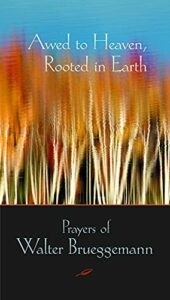
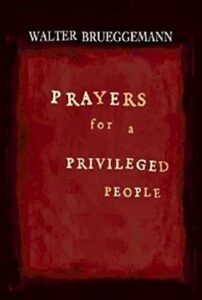 Awed to Heaven, Rooted in Earth: Prayers of Water Brueggemann (Fortress) $19.00 OUR SALE PRICE = $15.20
Awed to Heaven, Rooted in Earth: Prayers of Water Brueggemann (Fortress) $19.00 OUR SALE PRICE = $15.20
Prayers for a Privileged People (Abingdon Press) $25.99 OUR SALE PRICE = $20.79
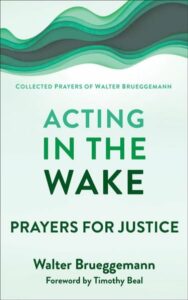
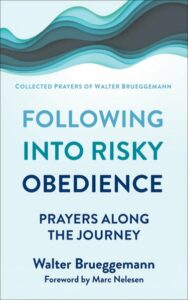 Acting in the Wake: Prayers for Justice (WJK) $17.00 OUR SALE PRICE = $13.60
Acting in the Wake: Prayers for Justice (WJK) $17.00 OUR SALE PRICE = $13.60
Following into Risky Obedience: Prayers Along the Journey (WJK) $17.00 OUR SALE PRICE = $13.60
BOOKS ABOUT PREACHING
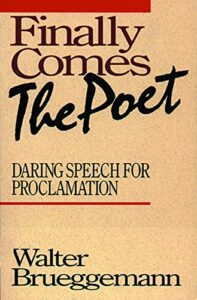 Finally Comes the Poet: Daring Speech for Proclamation (Fortress) $29.00 OUR SALE PRICE = $23.30
Finally Comes the Poet: Daring Speech for Proclamation (Fortress) $29.00 OUR SALE PRICE = $23.30
Written in the late 1980s, this remains a classic text in contemporary homiletics and is one of the top books Brueggemann recommends to understand his body of work. At least once he suggested it was his own favorite! He has always studied the rhetoric of the Bible utterances and it was natural for him to translate that into Biblically inspired poetic theories of “daring speech.”
Fascinating, eh? Did I mention it’s a classic?
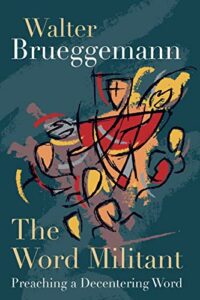 The Word Militant: Preaching a Decentering Word (Fortress) $24.00 OUR SALE PRICE = $19.20
The Word Militant: Preaching a Decentering Word (Fortress) $24.00 OUR SALE PRICE = $19.20
He reminds us that preaching has always been “an audacious task” and invites preachers to takes seriously all that is at stake. Veteran thinker and preacher (and author of a handful of preaching texts) William Willimon says that “Brueggemann proves an emergency and shame an d accommodated culture-bound, tamed, therapeutic church with his fecund prophetic re-descriptions and creative transpositions that speak the biblical word into our time and place.” Yup. He even sounds like Brueggemann when he says that God is “ceaselessly interesting.”
Yes, the word has made preachers militant. Yet, yet, y et certainly not in the manner of the violent January 6th rioters. You understand that he doesn’t mean that. Read this to understand a better way.
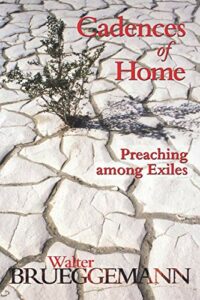 Cadences of Home: Preaching Among Exiles (WJK) $30.00 OUR SALE PRICE = $24.00
Cadences of Home: Preaching Among Exiles (WJK) $30.00 OUR SALE PRICE = $24.00
I love this book and have read it more than once. The notion that we are exiles here in post-Christian, post-Christendom America is compelling and generative. Can he fuel our own imaginations to preach through honest speech in a way that leads us to radical ways of faithfulness in but not of the world? His reflections on how the church is in a situation somewhat comparable to the ancient Israelites captivity in Babylon is instructive, and his provocative call to preach like that is so is extraordinary.
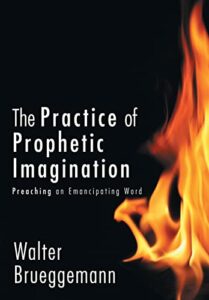 The Practice of Prophetic Imagination: Preaching an Emancipating Word (Fortress) $29.00 OUR SALE PRICE = $23.20
The Practice of Prophetic Imagination: Preaching an Emancipating Word (Fortress) $29.00 OUR SALE PRICE = $23.20
This handsome hardback gets serious about how we actually can preach an “emancipating word” and what the “practice” of preaching towards a Christian imagination looks like.
Listen to Sam Wells, a great storyteller, theologian, and liturgical preacher:
Walter Brueggemann’s early work on prophecy and imagination has become foundational for a whole generation of preachers and scholars. Here he returns to perhaps the most characteristic of all his myriad ventures, with unaltered vigor and razor-sharp edge. Prophets are not just provocateurs: they are those who profoundly love their people, deeply — Sam Wells, author of Humbler Faith, Bigger God: Finding a Story to Live By
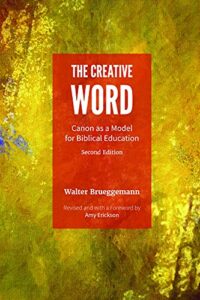 The Creative Word: Canon as a Model for Biblical Education (Fortress) $29.00 OUR SALE PRICE = $23.20
The Creative Word: Canon as a Model for Biblical Education (Fortress) $29.00 OUR SALE PRICE = $23.20
Admittedly, this is not about homiletics, but it fits to list it here. Now in a revised and updated second edition (with an excellent new forward by Amy Erickson) The Creative Word seems to have comesout of that period when Brueggemann (after earning his ThD at Union in New York) felt called to get a PhD in educational theory. (He was, after all, a Dean and active teacher at a seminary and felt the need to learn more about pedagogy and Christian education.) This book is not about preaching, per say, but about nurture and formation, about pedagogy and education — think of the remarkably innovative new approaches developed decades ago from John Dewy to Paulo Freire. Yet, it really is yet another heavy study of the notion of the canon, the notions of the Word of the Lord, the structures within the Old Testament, and the way a high regard for the formation of these many texts together can shape a congregations worldview. In a way, it is asking how congregations equip their youth and how they assimilate new members.
As the back cover promises,
“Brueggemann here offers a framework for education in the structure of the Hebrew Bible canon, with its assertion of center and limit (in the Torah), of challenge (in the Prophets), and of inquiry (in the Writings).”
Alrightee, then. Whew.
THREE MAJOR SCHOLARLY WORKS
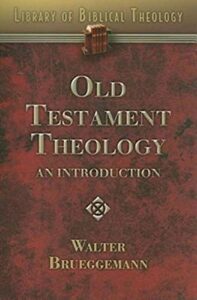 Old Testament Theology: An Introduction (Abingdon Press) $32.00 OUR SALE PRICE = $25.60 (This is a limited time, special sale price; new copies will come in at $42.00. Get them at this cheaper price, only while supplies last.)
Old Testament Theology: An Introduction (Abingdon Press) $32.00 OUR SALE PRICE = $25.60 (This is a limited time, special sale price; new copies will come in at $42.00. Get them at this cheaper price, only while supplies last.)
This is not as scholarly as it may seem and is readable to most educated adults. It’s a nice overview of the entire Old Testament and the theology that emerges from the various streams, threats, writers, genres, and literary voices in the unfolding history of ancient Israel. It does intend to offer a model for doing theologizing with full engagement with the Biblical text. The publisher describes it as Brueggemann portrays the key components in Israel’s encounter with God as recorded in the Hebrew Bible. Creation, election, Torah, and the divine hand in history–these and other theological high points appear both in their original historical context, and their ongoing relevance for contemporary Jewish and Christian understanding.
Terrence Fretheim, a prominent Old Testament scholar, now retired from Luther Seminary, says that it’s effect “is to present the reader with a remarkable tapestry that lingers long in both mind and heart.”
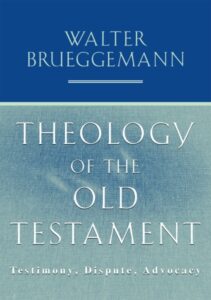 Theology of the Old Testament: Testimony, Dispute, Advocacy (Fortress) $35.00 OUR SALE PRICE = $28.00
Theology of the Old Testament: Testimony, Dispute, Advocacy (Fortress) $35.00 OUR SALE PRICE = $28.00
Some might say that this is the most important of the many works of Dr. Walter Brueggemann, his lifetime achievement, but I wouldn’t be so sure. It is, doubtlessly, his most academic magnum opus and in our forty years of bookselling cannot think of a comparable theological title that garnered so much anticipation, attention, discussion and debate. Releasing in 1997 (and weighing in at 2 1/2 pounds and 778 pages) it is monumental and complex. The ideas are complex, the writing is technical, and while it still carries some of Brueggemann’s clever zeal and charm, it is dense and at times obtuse.
No lesser light in the field than Phyllis Trible (herself at Union in New York where Walter once studied) says “This monumental endeavor offers an abundance of ideas that will carry Old Testament theology well into the twenty-first century.” She observes that he “understands that the standard formulations of the past but yield to new speech for new situations.”
His friend and critic Terence Fretheim notes that Walter is one of the few biblical scholars who “commands the range of scholarship, the insights into texts, and the theological imagination to take up this task.”
We have an edition that has a searchable CD-Rom with it. It’s no longer available, but we’e got a few. Order now while we have that edition. Pretty cool.
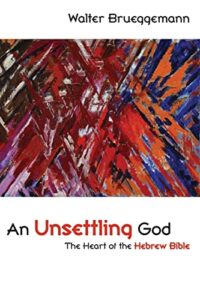 An Unsettling God: The Heart of the Hebrew Bible (Fortress) $27.00 OUR SALE PRICE = $21.60
An Unsettling God: The Heart of the Hebrew Bible (Fortress) $27.00 OUR SALE PRICE = $21.60
This came out a decade after Theology of the Old Testament and offers a distillation, a summarizing and somewhat less technical reflection on his majestical major text. It is less than 200 pages and promises to “distill a career’s worth of insights into the core message of the Hebrew Bible. The work presents the theologian at his most engaging, offering profound insights tailored especially for the beginning student.”
Well, I’ll admit, I still didn’t get into it. It is important, and a major overview of his deepest considerations about the “unsettled” God of the Bible. I’m intrigued by his claim that the Old Testament shows God with four “conversion partners” — Israel, the nations, creation itself, and the individual human being — who help God enact the divine purpose.
TWO FESTSCHRIFTS IN HONOR OF BRUEGGEMANN
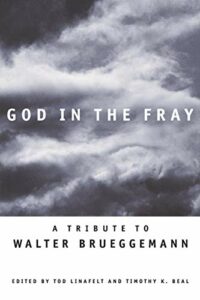 God In the Fray: A Tribute To Walter Brueggemann (Fortress) $35.00 OUR SALE PRICE = $28.00
God In the Fray: A Tribute To Walter Brueggemann (Fortress) $35.00 OUR SALE PRICE = $28.00
This is an extraordinary festschrifts, some scholarly articles offered up in honor of Walter and a few about him, including the (exceedingly friendly) critical pice by Terence Fretheim that Kanagy discusses in his forthcoming biography. It is a very illuminating piece, deep and complex but a must-read for those deeply interested in Brueggemann’s Theology in the Old Testament. You’ll find here some of the major mainline Biblical scholars who were peers (and some who were students) of Dr. B, from Norman Gottwald to Kathleen O’Connor to Phyllis Triple to Claus Westermann to Timothy Beal, among many others. There is a splendid response by Brueggemann himself, characteristically gracious and lucid.
 Shaking Heaven and Earth Essays in Honor of Walter Brueggemann and Charles B. Cousar (WJK) $24.00 OUR SALE PRICE = $19.20 This is a limited time, special sale price; new copies will come in at $34.00. Get them at this cheaper price, only while supplies last.
Shaking Heaven and Earth Essays in Honor of Walter Brueggemann and Charles B. Cousar (WJK) $24.00 OUR SALE PRICE = $19.20 This is a limited time, special sale price; new copies will come in at $34.00. Get them at this cheaper price, only while supplies last.
This is a double festschrift, offered when these two professors (now Emeritus) at Columbia Theological Seminary were retiring, Brueggemann, of course, a professor in Old Testament and Courser who was a legendary New Testament guy. They have worked together often and these essays are examples of the high-level scholarship their educational ministries nurtured. They both were closer readers of the Biblical text, both believed God truly shared the world, and that we respond in doxology and justice-seeking. The book is offered also for their “gifts of collegiality and friendship” “with deep love and gratitude.” I enjoy this kind of stuff and it is a fabulous collection of various sorts of scholars and preachers showing their work.
Of the two volumes, this one is a bit more readable, it seems, less technical, with pieces from the likes of Beverly Gavanta and Leander Keck and Carol Newsome. Solid, thoughtful, applicable stuff, all about transformative study and the role of these two wild and prophetic gentleman. Naturally, there is a god pice by Cousar and a lovely and touch reply by Brueggemann at the end.
And don’t forget yesterday’s posting where I reviewed the forthcoming authorized biography of Brueggemann by Elizabethtown (PA) sociologist Conrad Kanagy, entitled Walter Brueggemann’s Prophetic Imagination: A Theological Biography. We are taking pre-orders and will send it out when it arrives in early-to-mid October. (Click back to yesterday’s BookNotes for my review and all the details.) It is priced at $24.99 but we have it at our BookNotes 20% OFF — $19.99.) We sure would appreciate it if you helped us spread the word. Thanks.

+++
TO PLACE AN ORDER
PLEASE READ, THEN SCROLL DOWN AND CLICK ON THE “ORDER HERE” LINK BELOW.
It is helpful if you tell us how you want us to ship your orders.And if you are doing a pre-order, tell us if you want us to hold other books until the pre-order comes, or send some now, and others later… we’re eager to serve you in a way that you prefer.
The weight and destination of your package varies but you can use this as a quick, general guide:
There are generally two kinds of US Mail options and, of course, UPS. If necessary, we can do overnight and other expedited methods, too. Just ask.
- United States Postal Service has the option called “Media Mail” which is cheapest but can be a little slower. For one typical book, usually, it’s $4.12; 2 lbs would be $4.87. This is the cheapest method available.
- United States Postal Service has another, quicker option called “Priority Mail” which is $8.50, if it fits in a flat-rate envelope. Many children’s books and some Bibles are oversized so that might take the next size up which is $9.20. “Priority Mail” gets much more attention than does “Media Mail” and is often just a few days to anywhere in the US.
- UPS Ground is reliable but varies by weight and distance and may take longer than USPS. Sometimes they are cheaper that Priority. We’re happy to figure out your options for you once we know what you want.
If you just want to say “cheapest” that is fine. If you are eager and don’t want the slowest method, do say so. It really helps us serve you well so let us know.
BookNotes
SPECIAL
DISCOUNT
20% OFF
ALL BOOKS MENTIONED
+++
order here
this takes you to the secure Hearts & Minds order form page
just tell us what you want to order
inquire here
if you have questions or need more information
just ask us what you want to know
Hearts & Minds 234 East Main Street Dallastown PA 17313
read@heartsandmindsbooks.com
717-246-3333
Sadly, as of September 2023 we are still closed for in-store browsing. COVID is not fully over. Since few are reporting their illnesses anymore, it is tricky to know the reality but the best measurement is to check the waste water tables to see the amount of virus in the eco-system. It is bad and now getting worse. It’s important to be aware of how risks we take might effect the public good — those at risk, while not dying from the virus, are experiencing long-term health consequences. (Just check the latest reports of the rise of heart attacks and diabetes among younger adults, caused by Covid.) It is complicated, but we are still closed for in-store browsing due to our commitment to public health (and the safety of our family who live here, our staff, and customers.) Our store is a bit cramped without top-notch ventilation, so we are trying to be wise. Thanks for understanding.
We will keep you posted about our future plans… we are eager to reopen.
We are doing our curb-side and back yard customer service and can show any number of items to you if you call us from our back parking lot. It’s sort of fun, actually. We are eager to serve and grateful for your patience as we all work to mitigate the pandemic. We are very happy to help, so if you are in the area, do stop by. We love to see friends and customers.
We’re happy to ship books anywhere.
We are here 10:00 – 6:00 EST / Monday – Saturday. Closed on Sunday.


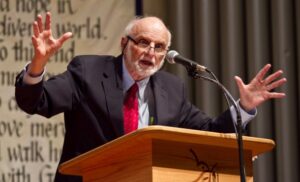 As the story develops we see that Brueggemann made some hard (if, in retrospect, understandable) choices of not being a pure academician, not working solely in the high-octane world of the theological academy, but by teaching in seminaries designed to serve those heading into the ministry. (We learn that at one point, mid-career, Walter turned down a prestigious job offer to teach at a fancy-pants divinity school.) Walter’s famously tireless commitment to the church, shown in his doing workshops for congregations, preaching around, for serving many denominations, was apparently appealing to the Mennonite Kanagy. Had Walter just been another esteemed but arcane Biblical scholar with a few heady books under his belt my sense is that he would not be as well known or as well loved as he is. Kanagy’s book portrays Brueggemann as a church guy, who — despite some famous leadership in scholarly circles, seminal lectures known the world over, and controversies caused at the Society for Biblical Literature, say — mostly taught preachers to wrestle with the Bible with and for their congregations.
As the story develops we see that Brueggemann made some hard (if, in retrospect, understandable) choices of not being a pure academician, not working solely in the high-octane world of the theological academy, but by teaching in seminaries designed to serve those heading into the ministry. (We learn that at one point, mid-career, Walter turned down a prestigious job offer to teach at a fancy-pants divinity school.) Walter’s famously tireless commitment to the church, shown in his doing workshops for congregations, preaching around, for serving many denominations, was apparently appealing to the Mennonite Kanagy. Had Walter just been another esteemed but arcane Biblical scholar with a few heady books under his belt my sense is that he would not be as well known or as well loved as he is. Kanagy’s book portrays Brueggemann as a church guy, who — despite some famous leadership in scholarly circles, seminal lectures known the world over, and controversies caused at the Society for Biblical Literature, say — mostly taught preachers to wrestle with the Bible with and for their congregations.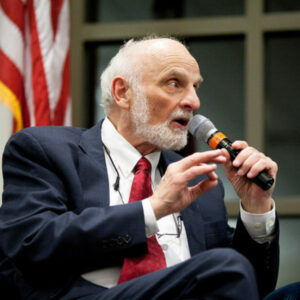 in the best of mainline/ecumenical studies of the last century — he studied at Union with the famous James Muilenburg
in the best of mainline/ecumenical studies of the last century — he studied at Union with the famous James Muilenburg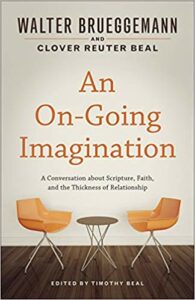
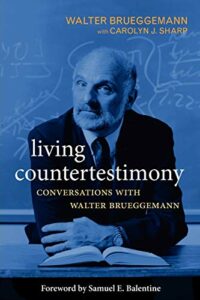 A few of these names will be known by those who follow Brueggemann’s publishing career as they have gone on to write books with him, such as Clover Reuter Beal, who published a book called An On-Going Imagination: Conversations About Scripture, Faith, and the Thickness of Relationships (WJK; $18.00 – OUR SALE PRICE = $14.40) and Carolyn Sharp, who teaches a course at Yale Divinity School on Brueggemann, who has given us Living Countertestimony: Conversations with Walter Brueggemann (WJK; $20.00 – OUR SALE PRICE = $1`6.00) as well as her excellent guide to Brueggemann’s work, Disruptive Grace: Reflections on God, Scripture, and the Church which, although mostly an anthology of Brueggemann’s best work up to that time, was curated and introduced helpfully by Sharp. (Fortress; $35.00 – OUR SALE PRICE = $28.00.) These fine folks who discovered Walter’s influence as young scholars, pastors, or activists, and their testimony about his generative role in their lives, is fascinating.
A few of these names will be known by those who follow Brueggemann’s publishing career as they have gone on to write books with him, such as Clover Reuter Beal, who published a book called An On-Going Imagination: Conversations About Scripture, Faith, and the Thickness of Relationships (WJK; $18.00 – OUR SALE PRICE = $14.40) and Carolyn Sharp, who teaches a course at Yale Divinity School on Brueggemann, who has given us Living Countertestimony: Conversations with Walter Brueggemann (WJK; $20.00 – OUR SALE PRICE = $1`6.00) as well as her excellent guide to Brueggemann’s work, Disruptive Grace: Reflections on God, Scripture, and the Church which, although mostly an anthology of Brueggemann’s best work up to that time, was curated and introduced helpfully by Sharp. (Fortress; $35.00 – OUR SALE PRICE = $28.00.) These fine folks who discovered Walter’s influence as young scholars, pastors, or activists, and their testimony about his generative role in their lives, is fascinating. The Just Kitchen: Invitations to Sustainability, Cooking, Connection, and Celebration Derrick Weston & Anna Woofenden (Broadleaf Books) $29.99
The Just Kitchen: Invitations to Sustainability, Cooking, Connection, and Celebration Derrick Weston & Anna Woofenden (Broadleaf Books) $29.99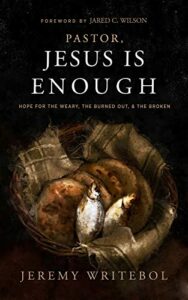 Pastor, Jesus Is Enough: Hope for the Weary, the Burned Out, and the Broken Jeremy Writebol (Lexham Press) $16.99
Pastor, Jesus Is Enough: Hope for the Weary, the Burned Out, and the Broken Jeremy Writebol (Lexham Press) $16.99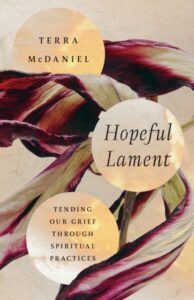 Hopeful Lament: Tending Our Grief Through Spiritual Practices Terra McDaniel (IVP) $18.00
Hopeful Lament: Tending Our Grief Through Spiritual Practices Terra McDaniel (IVP) $18.00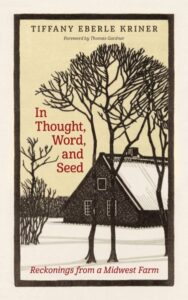 In Thought, Word, and Seed: Reckonings from a Midwest Farm Tiffany Eberle Kriner (Eerdmans) $19.99
In Thought, Word, and Seed: Reckonings from a Midwest Farm Tiffany Eberle Kriner (Eerdmans) $19.99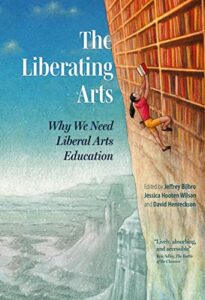 The Liberating Arts: Why We Need Liberal Arts Education edits by Jeffrey Bilbro, Jessica Hooten Wilson & David Henreckson (Plough Publishing) $19.95
The Liberating Arts: Why We Need Liberal Arts Education edits by Jeffrey Bilbro, Jessica Hooten Wilson & David Henreckson (Plough Publishing) $19.95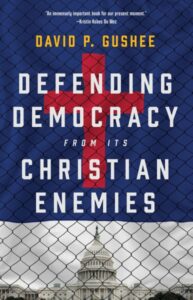 Defending Democracy from Its Christian Enemies David P. Gushee (Eerdmans) $21.99
Defending Democracy from Its Christian Enemies David P. Gushee (Eerdmans) $21.99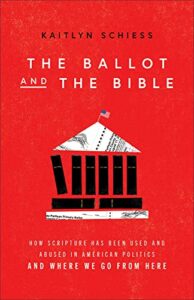 The Ballot and the Bible: How Scripture Has Been Used and Abused in American Politics –
The Ballot and the Bible: How Scripture Has Been Used and Abused in American Politics –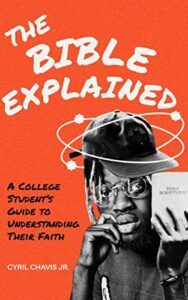 The Bible Explained: A College Student’s Guide to Understanding Their Faith Cyril Chavis Jr. (Hides Publishing)
The Bible Explained: A College Student’s Guide to Understanding Their Faith Cyril Chavis Jr. (Hides Publishing)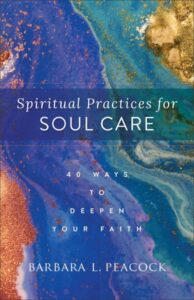 Spiritual Practices for Soul Care: 40 Ways to Deepen Your Faith Barbara L. Peacock (Baker Books) $18.99
Spiritual Practices for Soul Care: 40 Ways to Deepen Your Faith Barbara L. Peacock (Baker Books) $18.99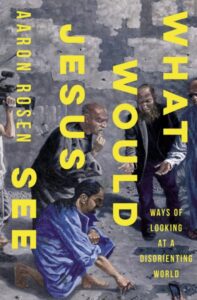 What Would Jesus See: Ways of Looking at a Disorienting World Aaron Rosen (Broadleaf Books) $26.99
What Would Jesus See: Ways of Looking at a Disorienting World Aaron Rosen (Broadleaf Books) $26.99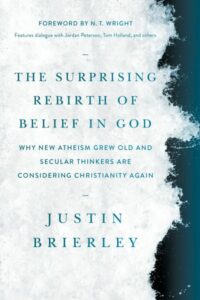 The Surprising Rebirth of Belief in God: Why New Atheism Grew Old and Secular Thinkers are Considering Christianity Again Justin Brierley (Tyndale Momentum) $17.99
The Surprising Rebirth of Belief in God: Why New Atheism Grew Old and Secular Thinkers are Considering Christianity Again Justin Brierley (Tyndale Momentum) $17.99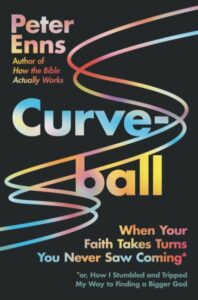 Curve-ball: When Your Faith Takes Turns You Never Saw Coming (Or, How I Stumbled and Tripped My Way to Finding a Bigger God) Peter Enns (HarperOne) $29.99
Curve-ball: When Your Faith Takes Turns You Never Saw Coming (Or, How I Stumbled and Tripped My Way to Finding a Bigger God) Peter Enns (HarperOne) $29.99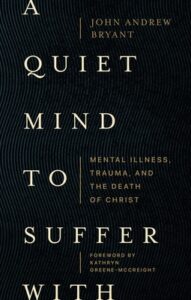 A Quiet Mind to Suffer With: Mental Illness, Trauma, and the Death of Christ John Andrew Bryant (Lexham Press) $19.99
A Quiet Mind to Suffer With: Mental Illness, Trauma, and the Death of Christ John Andrew Bryant (Lexham Press) $19.99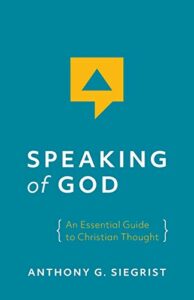 Speaking of God: An Essential Guide to Christian Thought Anthony G. Siegrist (Herald Press) $18.00
Speaking of God: An Essential Guide to Christian Thought Anthony G. Siegrist (Herald Press) $18.00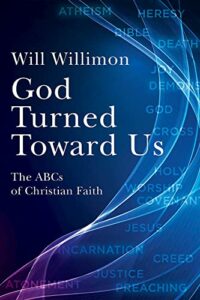 God Turned Toward Us: The ABCs of Christian Faith Will Willimon (Abingdon Press) $16.99
God Turned Toward Us: The ABCs of Christian Faith Will Willimon (Abingdon Press) $16.99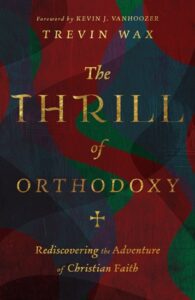 The Thrill of Orthodoxy: Rediscovering the Adventure of the Christian Faith Trevin Wax (IVP) $24.00
The Thrill of Orthodoxy: Rediscovering the Adventure of the Christian Faith Trevin Wax (IVP) $24.00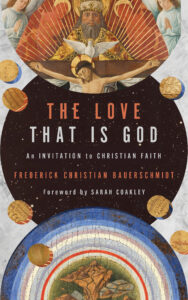 The Love That Is God: An Invitation to the Christian Faith Frederick Christian Bauerschmidt (Eerdmans) $18.99 OUR SALE PRICE = $15.19
The Love That Is God: An Invitation to the Christian Faith Frederick Christian Bauerschmidt (Eerdmans) $18.99 OUR SALE PRICE = $15.19 Re-Enchanting the Text: Discovering the Bible as Sacred, Dangerous, and Mysterious Cheryl Bridges Johns (Brazos Press) $22.99 OUR SALE PRICE = $18.39
Re-Enchanting the Text: Discovering the Bible as Sacred, Dangerous, and Mysterious Cheryl Bridges Johns (Brazos Press) $22.99 OUR SALE PRICE = $18.39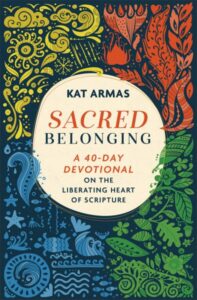 Sacred Belonging: A 40-Day Devotional on the Liberating Heart of Scripture Kat Armas (Brazos Press) $16.99
Sacred Belonging: A 40-Day Devotional on the Liberating Heart of Scripture Kat Armas (Brazos Press) $16.99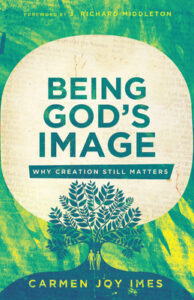 Being God’s Image: Why Creation Still Matters Carmen Joy Imes (IVP Academic) $22.00 OUR SALE PRICE = $17.60
Being God’s Image: Why Creation Still Matters Carmen Joy Imes (IVP Academic) $22.00 OUR SALE PRICE = $17.60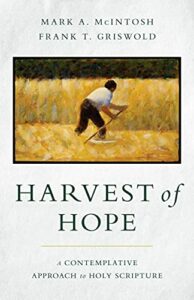 Harvest of Hope: A Contemplative Approach to Holy Scriptures Mark McIntosh & Frank Griswold (Eerdmans) $22.99
Harvest of Hope: A Contemplative Approach to Holy Scriptures Mark McIntosh & Frank Griswold (Eerdmans) $22.99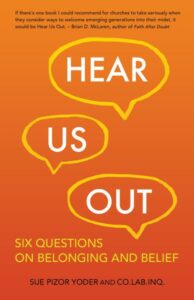 Hear Us Out: Six Questions on Belonging and Belief Sue Pizor Yoder and Co.Lab.Inq (Fortress Press) $24.00 OUR SALE PRICE = $19.20
Hear Us Out: Six Questions on Belonging and Belief Sue Pizor Yoder and Co.Lab.Inq (Fortress Press) $24.00 OUR SALE PRICE = $19.20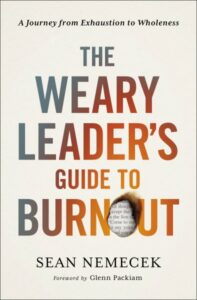 The Weary Leader’s Guide to Burnout: A Journey from Exhaustion to Wholeness Sean Nemecek (Zondervan) $19.99
The Weary Leader’s Guide to Burnout: A Journey from Exhaustion to Wholeness Sean Nemecek (Zondervan) $19.99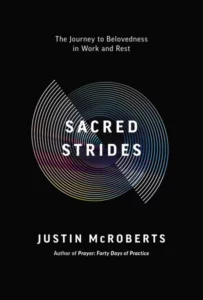 Sacred Strides: The Journey to Belovedness in Work and Rest Justin McRoberts (Thomas Nelson) $18.99
Sacred Strides: The Journey to Belovedness in Work and Rest Justin McRoberts (Thomas Nelson) $18.99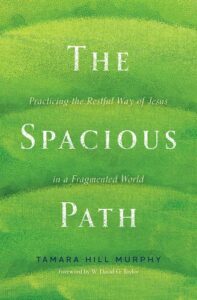 The Spacious Path: Practicing the Restful Way of Jesus in a Fragmented World Tamara Hill Murphy (Herald Press) $18.99
The Spacious Path: Practicing the Restful Way of Jesus in a Fragmented World Tamara Hill Murphy (Herald Press) $18.99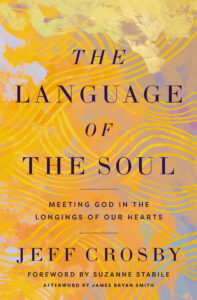 The Language of the Soul: Meeting God in the Longings of Our Hearts Jeff Crosby (Broadleaf Books) $26.99
The Language of the Soul: Meeting God in the Longings of Our Hearts Jeff Crosby (Broadleaf Books) $26.99 Surrender to Love: Discovering the Heart of Christian Spirituality David Bender (IVP /formatio) $17.00
Surrender to Love: Discovering the Heart of Christian Spirituality David Bender (IVP /formatio) $17.00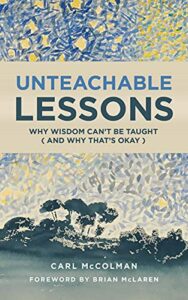 Unteachable Lessons: Why Wisdom Can’t Be Taught (and Why That’s Okay) Carl McColman (Eerdmans) $16.99
Unteachable Lessons: Why Wisdom Can’t Be Taught (and Why That’s Okay) Carl McColman (Eerdmans) $16.99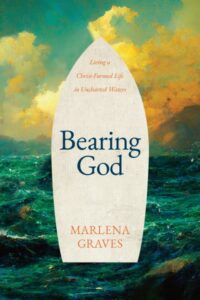 Bearing God: Living a Christ-Formed Life in Uncharted Water Marlena Graves (NavPress) $10.99
Bearing God: Living a Christ-Formed Life in Uncharted Water Marlena Graves (NavPress) $10.99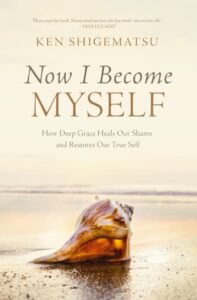 Now I Become Myself: How Deep Grace Heals Our Shame and Restores Our True Self Ken Shigematsu (Zondervan) $19.99
Now I Become Myself: How Deep Grace Heals Our Shame and Restores Our True Self Ken Shigematsu (Zondervan) $19.99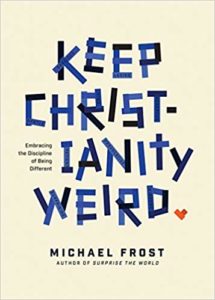 Keep Christianity Weird: Embracing the Discipline of Being Different Michael Frost (NavPress) $7.99
Keep Christianity Weird: Embracing the Discipline of Being Different Michael Frost (NavPress) $7.99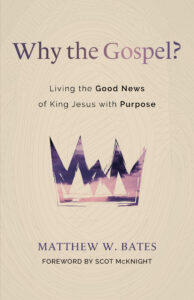 Why the Gospel? Living the Good News of King Jesus with Purpose Matthew W. Bates (Eerdmans) $17.99
Why the Gospel? Living the Good News of King Jesus with Purpose Matthew W. Bates (Eerdmans) $17.99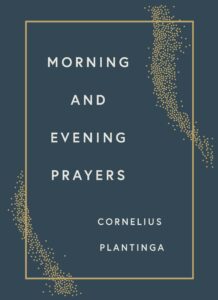 Morning and Evening Prayers Cornelius Plantinga (Eerdmans) $20.99
Morning and Evening Prayers Cornelius Plantinga (Eerdmans) $20.99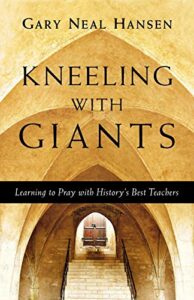 Kneeling with Giants: Learning to Pray with History’s Best Teachers Gary Neal Hansen (IVP) $24.00
Kneeling with Giants: Learning to Pray with History’s Best Teachers Gary Neal Hansen (IVP) $24.00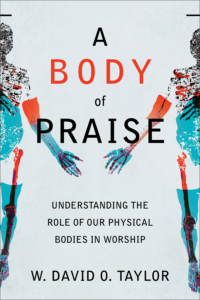 A Body of Praise: Understanding the Role of Our Physical Bodies in Worship W. David O. Taylor (Baker Academic) $26.99
A Body of Praise: Understanding the Role of Our Physical Bodies in Worship W. David O. Taylor (Baker Academic) $26.99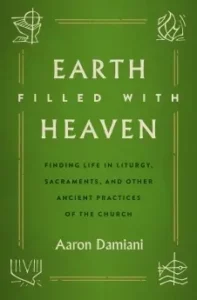 Earth Filled with Heaven: Finding Life in Liturgy, Sacraments, and other Ancient Practices of the Church Aaron Damiani (Mood Press) $14.99
Earth Filled with Heaven: Finding Life in Liturgy, Sacraments, and other Ancient Practices of the Church Aaron Damiani (Mood Press) $14.99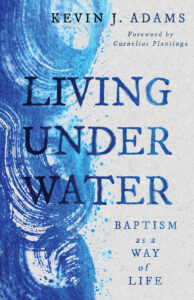 Living Under Water: Baptism as a Way of Life Kevin Adams (Eerdmans) $19.99
Living Under Water: Baptism as a Way of Life Kevin Adams (Eerdmans) $19.99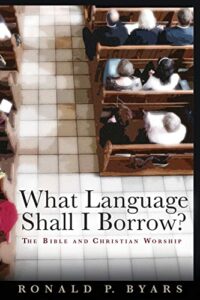 What Language Shall I Borrow? The Bible and Christian Worship Ronald Byers (Eerdmans) $18.00
What Language Shall I Borrow? The Bible and Christian Worship Ronald Byers (Eerdmans) $18.00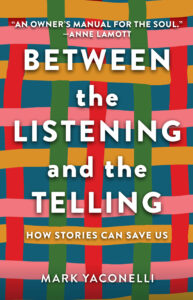 Between the Listening and the Telling: How Stories Can Save Us Mark Yaconelli (Broadleaf Books) $24.99
Between the Listening and the Telling: How Stories Can Save Us Mark Yaconelli (Broadleaf Books) $24.99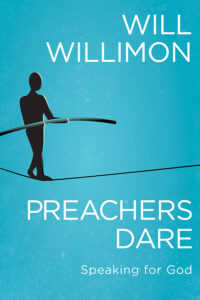 Preachers Dare: Speaking for God Will Willimon (Abingdon Press) $19.99
Preachers Dare: Speaking for God Will Willimon (Abingdon Press) $19.99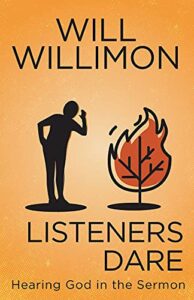 preachers up to the generative power of God’s own triune speech.” The great Paul Scott Wilson says it is written with “sparking wit and deep spiritual insight.” The clever Jason Mitchell makes you want to read it, unless, maybe you’re scared to. You might be “haunted by the truth that the only good reason for someone to show up for your sermon is, that, in it, there will be a word from the Living God.” Wow.
preachers up to the generative power of God’s own triune speech.” The great Paul Scott Wilson says it is written with “sparking wit and deep spiritual insight.” The clever Jason Mitchell makes you want to read it, unless, maybe you’re scared to. You might be “haunted by the truth that the only good reason for someone to show up for your sermon is, that, in it, there will be a word from the Living God.” Wow.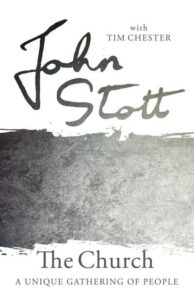 The Church: God’s Word for Today John Stott (IVP) $14.00 OUR SALE PRICE = $11.20
The Church: God’s Word for Today John Stott (IVP) $14.00 OUR SALE PRICE = $11.20 Delighted: What Teenagers Are Teaching the Church About Joy Kenda Creasy Dean, Wesley W. Ellis, Justin Forbes, Abigail Visco Rusert (Eerdmans) $16.00
Delighted: What Teenagers Are Teaching the Church About Joy Kenda Creasy Dean, Wesley W. Ellis, Justin Forbes, Abigail Visco Rusert (Eerdmans) $16.00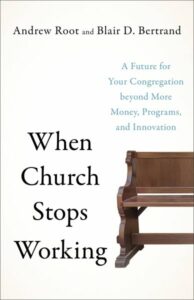 When Church Stops Working: A Future for Your Congregation Beyond More Money, Programs, and Innovation Andrew Root and Blaire D. Bertrand (Brazos Press) $21.99
When Church Stops Working: A Future for Your Congregation Beyond More Money, Programs, and Innovation Andrew Root and Blaire D. Bertrand (Brazos Press) $21.99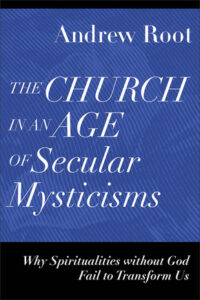 (The brand new one in this big and important series is due out in the next few weeks from Brazos and you can PRE-ORDER it from us now: The Church in an Age of Secular Mysticisms: Why Spiritualities Without God Fail to Transform Us; $28.99 – OUR SALE PRICE = $23.19.)
(The brand new one in this big and important series is due out in the next few weeks from Brazos and you can PRE-ORDER it from us now: The Church in an Age of Secular Mysticisms: Why Spiritualities Without God Fail to Transform Us; $28.99 – OUR SALE PRICE = $23.19.)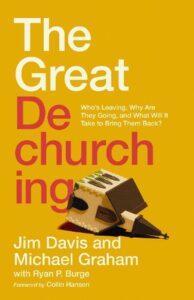 The Great Dechurching: Whose Leaving, Why Are They Going, and What Will It Take To Bring Them Back Jim David & Michael Graham, with Ryan Burge (Zondervan) $29.99
The Great Dechurching: Whose Leaving, Why Are They Going, and What Will It Take To Bring Them Back Jim David & Michael Graham, with Ryan Burge (Zondervan) $29.99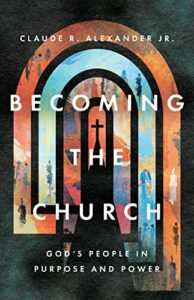 Becoming the Church: God’s People in Purpose and Power Claude R. Alexander, Jr. (IVP) $18.00 OUR SALE PRICE = $14.40
Becoming the Church: God’s People in Purpose and Power Claude R. Alexander, Jr. (IVP) $18.00 OUR SALE PRICE = $14.40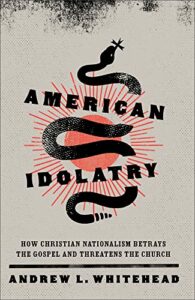 American Idolatry: How Christian Nationalism Betrays the Gospel and Threatens the Church Andrew Whitehead (Brazos Press) $24.99
American Idolatry: How Christian Nationalism Betrays the Gospel and Threatens the Church Andrew Whitehead (Brazos Press) $24.99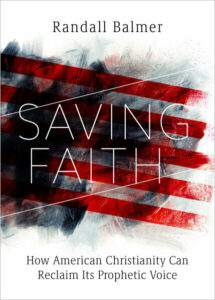 Saving Faith: How American Christianity Can Reclaim Its Prophetic Voice Randall Balmer (Fortress Press) $18.00
Saving Faith: How American Christianity Can Reclaim Its Prophetic Voice Randall Balmer (Fortress Press) $18.00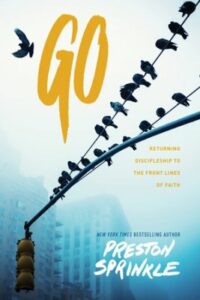 Go: Returning Discipleship to the Front Lines of Faith Preston Sprinkle (NavPress) $14.99
Go: Returning Discipleship to the Front Lines of Faith Preston Sprinkle (NavPress) $14.99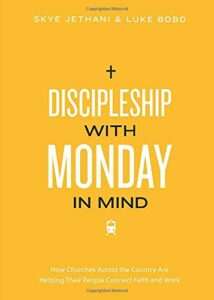 Discipleship with Monday in Mind: How Churches Across the Country Are Helping Helping THeir People Connect Faith and Work Skye Jethanie & Luke Bobo (Made to Flourish) $8.50
Discipleship with Monday in Mind: How Churches Across the Country Are Helping Helping THeir People Connect Faith and Work Skye Jethanie & Luke Bobo (Made to Flourish) $8.50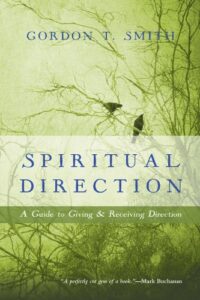 Spiritual Direction: A Guide to Giving and Receiving Direction Gordon T. Smith (IVP) $15.00
Spiritual Direction: A Guide to Giving and Receiving Direction Gordon T. Smith (IVP) $15.00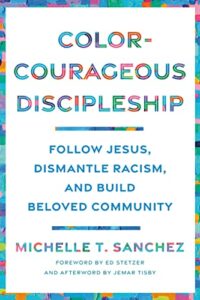 Color-Courageous Discipleship: Follow Jesus, Dismantle Racism, and Build Beloved Community Michelle T. Sanchez (Waterbrook) $18.00
Color-Courageous Discipleship: Follow Jesus, Dismantle Racism, and Build Beloved Community Michelle T. Sanchez (Waterbrook) $18.00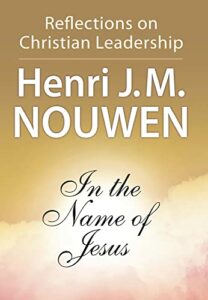 In the Name of Jesus: Reflections on Christian Leadership Henri Nouwen (Crossroad) $14.95
In the Name of Jesus: Reflections on Christian Leadership Henri Nouwen (Crossroad) $14.95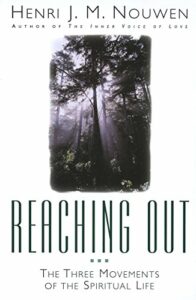 Reaching Out: The Three Movements of the Spiritual Life Henri Nouwen (Image) $16.00
Reaching Out: The Three Movements of the Spiritual Life Henri Nouwen (Image) $16.00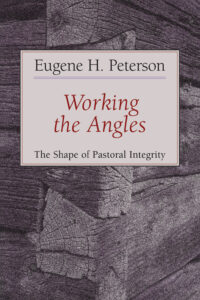 Working the Angles: The Shape of Pastoral Integrity Eugene Peterson (Eerdmans) $20.00
Working the Angles: The Shape of Pastoral Integrity Eugene Peterson (Eerdmans) $20.00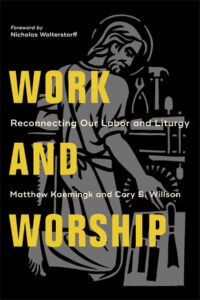 (I often dedicate the Labor Day weekend BookNotes to reflections on books about work but, to be honest, hardly anybody buys them, so I’m going to skip that this weekend, but hope that in church you participate in liturgies and sermons on work. If not, you and your church leaders need this,
(I often dedicate the Labor Day weekend BookNotes to reflections on books about work but, to be honest, hardly anybody buys them, so I’m going to skip that this weekend, but hope that in church you participate in liturgies and sermons on work. If not, you and your church leaders need this, 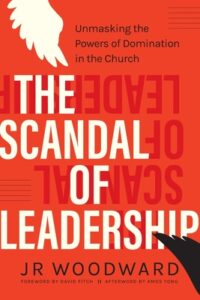 The Scandal of Leadership: Unmasking the Powers of Domination in the Church JR Woodward (100 Movements Publishing) $26.99
The Scandal of Leadership: Unmasking the Powers of Domination in the Church JR Woodward (100 Movements Publishing) $26.99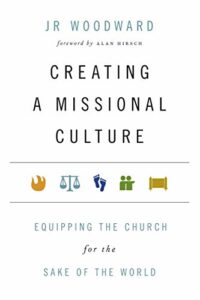 And most of it is very good. Is there a new way of “being and belonging”? Can we embrace being scandalized not by foolish abuse of power but by imitating the One who was himself a scandal? Is that how we subvert and resist the Powers? There is no other book that asks these kinds of questions about the ubiquitous task of leadership. I have a few small complaints, but, man, this is a leadership book unlike any I’ve ever seen. Theologically rich, culturally profound, spiritually alive, systematic and visionary, both, JR Woodward
And most of it is very good. Is there a new way of “being and belonging”? Can we embrace being scandalized not by foolish abuse of power but by imitating the One who was himself a scandal? Is that how we subvert and resist the Powers? There is no other book that asks these kinds of questions about the ubiquitous task of leadership. I have a few small complaints, but, man, this is a leadership book unlike any I’ve ever seen. Theologically rich, culturally profound, spiritually alive, systematic and visionary, both, JR Woodward 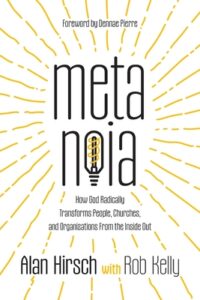 Metanoia: How God Radically Transforms People, Churches, and Organizations from the Inside Out
Metanoia: How God Radically Transforms People, Churches, and Organizations from the Inside Out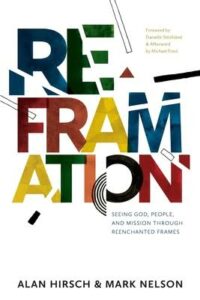 Hirsch has written before about this re-orienting paradigm shift that affects all that we are and all that we do and the way in which inward conversion leads to our influencing transformed churches and organizations. In a sense, Metanoia is a sequel to the very lively book co-written with our friend Mark Nelson (that I raved about at BookNotes) called Reframation: Seeing God, People, Mission Through Reenchanted Frames. In fact, in the opening “briefing for the (metanoic journey” that opens the new Metanoia book, Hirsch mentions this previous book. With the “ideological swirl” of the Trump years and the implications of the global pandemic, now, he thinks, the notion of a conversion to see through a Jesus-lens, is as urgent as ever.
Hirsch has written before about this re-orienting paradigm shift that affects all that we are and all that we do and the way in which inward conversion leads to our influencing transformed churches and organizations. In a sense, Metanoia is a sequel to the very lively book co-written with our friend Mark Nelson (that I raved about at BookNotes) called Reframation: Seeing God, People, Mission Through Reenchanted Frames. In fact, in the opening “briefing for the (metanoic journey” that opens the new Metanoia book, Hirsch mentions this previous book. With the “ideological swirl” of the Trump years and the implications of the global pandemic, now, he thinks, the notion of a conversion to see through a Jesus-lens, is as urgent as ever.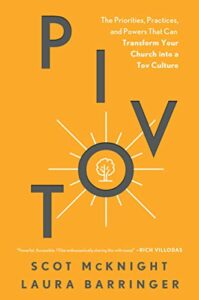 Pivot: The Priorities, Practices, and Powers That Can Transform Your Church into a Tov Culture Scot McKnight & Laura Barringer (Tyndale Elevate) $22.99
Pivot: The Priorities, Practices, and Powers That Can Transform Your Church into a Tov Culture Scot McKnight & Laura Barringer (Tyndale Elevate) $22.99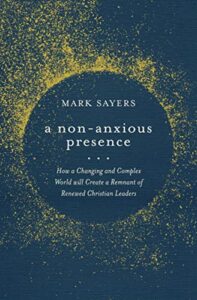 A Non-Anxious Presence: How a Changing and Complex World Will Create a Remnant of Renewed Christian Leaders Mark Sayers (Moody Press) $15.99
A Non-Anxious Presence: How a Changing and Complex World Will Create a Remnant of Renewed Christian Leaders Mark Sayers (Moody Press) $15.99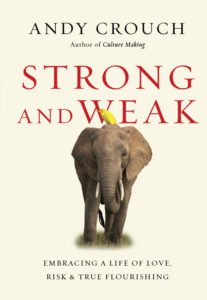 Strong and Weak: Embracing a Life of Love, Risk & True Flourishing Andy Crouch (IVP) $18.00
Strong and Weak: Embracing a Life of Love, Risk & True Flourishing Andy Crouch (IVP) $18.00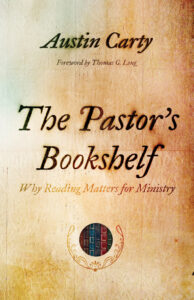 The Pastor’s Bookshelf: Why Reading Matters for Ministry Austin Carty (Eerdmans) $19.99
The Pastor’s Bookshelf: Why Reading Matters for Ministry Austin Carty (Eerdmans) $19.99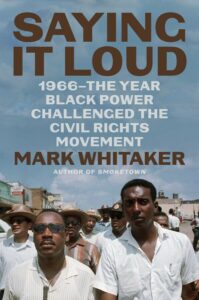 movement. You may recall I highlighted what I said was one of the best books I ever read, a remarkable, informative, page-turner walking you through the tumultuous year of 1966. Saying It Loud: 1966–The Year Black Power Challenged the Civil Rights Movement by Mark Whitaker, is simply a must-read. I’m picking it up a second time and enjoying it so much; it is at once oddly sobering and quite inspiring. It usually sells for $29.99 but at our BookNotes 20% off sale price we have it at $23.99. I hope you saw the others I reviewed and the three that I invited you to consider pre-ordering. You can do that by clicking on our order tab, below.
movement. You may recall I highlighted what I said was one of the best books I ever read, a remarkable, informative, page-turner walking you through the tumultuous year of 1966. Saying It Loud: 1966–The Year Black Power Challenged the Civil Rights Movement by Mark Whitaker, is simply a must-read. I’m picking it up a second time and enjoying it so much; it is at once oddly sobering and quite inspiring. It usually sells for $29.99 but at our BookNotes 20% off sale price we have it at $23.99. I hope you saw the others I reviewed and the three that I invited you to consider pre-ordering. You can do that by clicking on our order tab, below.
 Share the Dream: Shining a Light in a Divided World through Six Principles of Martin Luther King, Jr. DVD and Participant’s Guide hosted by Matthew Daniels and Chris Broussard
Share the Dream: Shining a Light in a Divided World through Six Principles of Martin Luther King, Jr. DVD and Participant’s Guide hosted by Matthew Daniels and Chris Broussard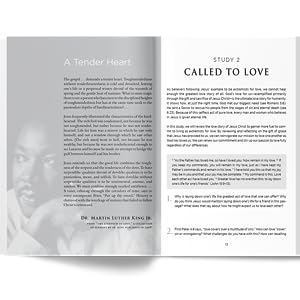 This pack includes a DVD and an excellent participant’s/leader’s workbook. It also includes an access code that allows you to stream the video content if you’d rather play it that way. There are discussion questions, reflection points, chapter summaries and a leader’s planning guide. There are nice graphics in the interior design and there are 18 small Bible studies to do between the sessions, or to draw from in your sessions. It’s fantastic and easy to use.
This pack includes a DVD and an excellent participant’s/leader’s workbook. It also includes an access code that allows you to stream the video content if you’d rather play it that way. There are discussion questions, reflection points, chapter summaries and a leader’s planning guide. There are nice graphics in the interior design and there are 18 small Bible studies to do between the sessions, or to draw from in your sessions. It’s fantastic and easy to use. EMBRACE A LIFE OF LOVE FOR ALL HUMANITY
EMBRACE A LIFE OF LOVE FOR ALL HUMANITY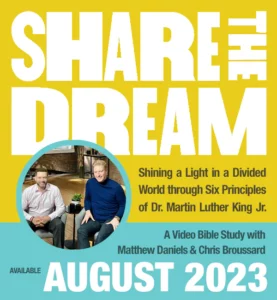
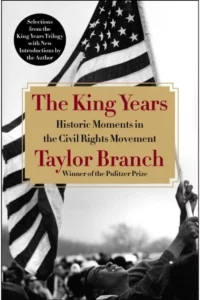 Previously, by the way, I have often recommended the excellent, concise abridgment of the world-class, huge, three volume history of the era, America in the King Years by Taylor Branch called The King Years: Historic Moments in the Civil Rights Movement (Simon & Schuster; $17.99 – OUR SALE PRICE = $14.39.) That is still excellent, and offers a historians overview of key moments, or episodes, in the struggle, but Saying It Loud tells of the people and their bravery, failures, angers, prayers, and accomplishments. Wow.
Previously, by the way, I have often recommended the excellent, concise abridgment of the world-class, huge, three volume history of the era, America in the King Years by Taylor Branch called The King Years: Historic Moments in the Civil Rights Movement (Simon & Schuster; $17.99 – OUR SALE PRICE = $14.39.) That is still excellent, and offers a historians overview of key moments, or episodes, in the struggle, but Saying It Loud tells of the people and their bravery, failures, angers, prayers, and accomplishments. Wow.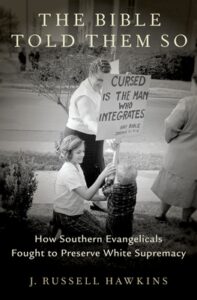 The Bible Told Them So: How Southern Evangelicals Fought to Preserve White Supremacy J Russell Hawkins (Oxford University Press) $29.95
The Bible Told Them So: How Southern Evangelicals Fought to Preserve White Supremacy J Russell Hawkins (Oxford University Press) $29.95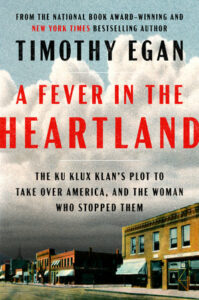 A Fever in the Heartland: The Klu Klux Klan’s Plot to Take Over America, and the Woman Who Stopped Them Timothy Egan (Viking) $30.00
A Fever in the Heartland: The Klu Klux Klan’s Plot to Take Over America, and the Woman Who Stopped Them Timothy Egan (Viking) $30.00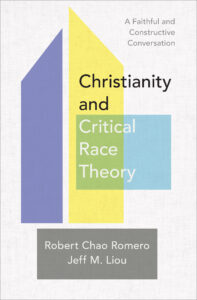 Christianity and Critical Race Theory: A Faithful and Constructive Conversation Robert Chao Romero & Jeff M. Liou (Baker Academic) $23.99
Christianity and Critical Race Theory: A Faithful and Constructive Conversation Robert Chao Romero & Jeff M. Liou (Baker Academic) $23.99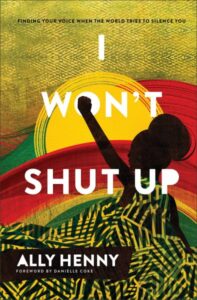 I Won’t Shut Up: Finding Your Voice When the World Tries to SIlence You Ally Henry (Baker Books) $24.99
I Won’t Shut Up: Finding Your Voice When the World Tries to SIlence You Ally Henry (Baker Books) $24.99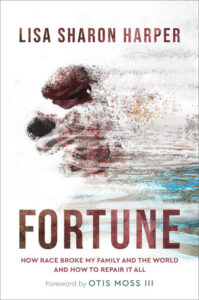 Fortune: How Race Broke My Family and the World And How to Repair It All Lisa Sharon Harper (Brazos Press) $24.99
Fortune: How Race Broke My Family and the World And How to Repair It All Lisa Sharon Harper (Brazos Press) $24.99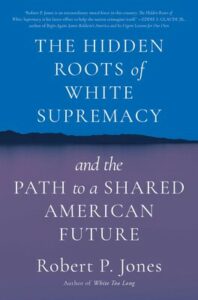 The Hidden Roots of White Supremacy: And the Path to a Shared American Future Robert P. Jones (Simon & Schuster) $29.99
The Hidden Roots of White Supremacy: And the Path to a Shared American Future Robert P. Jones (Simon & Schuster) $29.99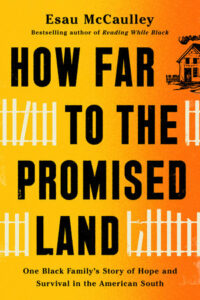 How Far to the Promised Land: One Black Family’s Story of Hope and Survival in the American South Esau McCaulley (Convergent) $27.00
How Far to the Promised Land: One Black Family’s Story of Hope and Survival in the American South Esau McCaulley (Convergent) $27.00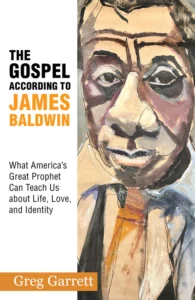 The Gospel According to James Baldwin: What America’s Great Prophet Can Teach us About Life, Love, and Identity Greg Garrett (Orbis Books) $24.00 OUR SALE PRICE = $19.20
The Gospel According to James Baldwin: What America’s Great Prophet Can Teach us About Life, Love, and Identity Greg Garrett (Orbis Books) $24.00 OUR SALE PRICE = $19.20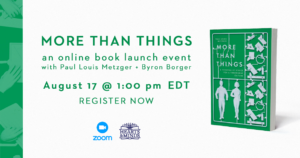
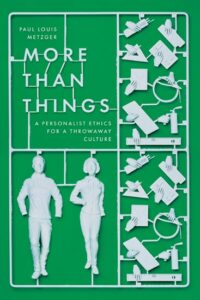 Paul Louis Metzger does a deep dive in More Than Things into this philosophy of personalism and the fabulous book cover aptly illustrates that we are not just plastic, not just cut-outs. I’m not sure if the plot and message of the Barbie movies fits in here — I’m going to ask him, that’s for sure — but Metzger is a culturally-aware public theologian who wants to show how a distinctively Christian worldview is, at heart, a matter of personalism; alive as we are in God’s world of good but fallen institutions and systems, but always as persons to be treated with dignity. His personal energy for this social ethic is matched by his exceptional kindness and grace. The book is brilliant and our time is going to be interesting.
Paul Louis Metzger does a deep dive in More Than Things into this philosophy of personalism and the fabulous book cover aptly illustrates that we are not just plastic, not just cut-outs. I’m not sure if the plot and message of the Barbie movies fits in here — I’m going to ask him, that’s for sure — but Metzger is a culturally-aware public theologian who wants to show how a distinctively Christian worldview is, at heart, a matter of personalism; alive as we are in God’s world of good but fallen institutions and systems, but always as persons to be treated with dignity. His personal energy for this social ethic is matched by his exceptional kindness and grace. The book is brilliant and our time is going to be interesting.
 Once you sign up
Once you sign up 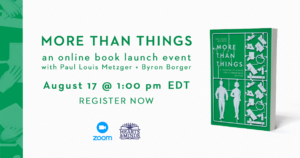
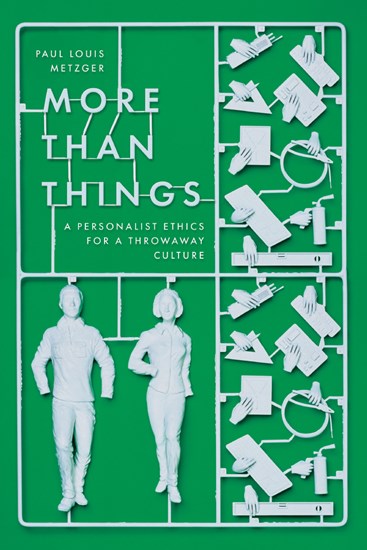 Big thanks to those who ordered books from the last few BookNotes. Don’t forget that we will continue to promote the extraordinary (if fairly scholarly and complex) new work by Paul Louis Metzger, the fabulous More Than Things: A Personalist Ethics for a Throwaway Culture (IVP Academic) in an on-line event on August 17th. If anybody can make a national Zoom event personal, I’d like to think Paul and I can. We’ll laugh some, chat some, maybe argue some, tell some tender stories, and take questions through the miracle of modern on-line technology. Paul is a great on-the-fly conversationalist and the hour will zoom by. I’ll send out a pre-registration link soon.
Big thanks to those who ordered books from the last few BookNotes. Don’t forget that we will continue to promote the extraordinary (if fairly scholarly and complex) new work by Paul Louis Metzger, the fabulous More Than Things: A Personalist Ethics for a Throwaway Culture (IVP Academic) in an on-line event on August 17th. If anybody can make a national Zoom event personal, I’d like to think Paul and I can. We’ll laugh some, chat some, maybe argue some, tell some tender stories, and take questions through the miracle of modern on-line technology. Paul is a great on-the-fly conversationalist and the hour will zoom by. I’ll send out a pre-registration link soon.  Wake Up to Wonder: 22 Invitations to Amazement in the Everyday Karen Wright Marsh (Brazos Press) $19.99
Wake Up to Wonder: 22 Invitations to Amazement in the Everyday Karen Wright Marsh (Brazos Press) $19.99 Stewarding Our Bodies: A Vision for Christian Student Affairs edited by Penny Glazer & Austin Smith (Abilene Christian University Press)
Stewarding Our Bodies: A Vision for Christian Student Affairs edited by Penny Glazer & Austin Smith (Abilene Christian University Press)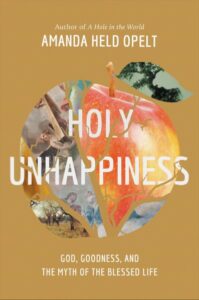 Holy Unhappiness: God’s Goodness, and the Myth of the Blessed Life Amanda Held Opelt (Worthy Publishing) $27.00
Holy Unhappiness: God’s Goodness, and the Myth of the Blessed Life Amanda Held Opelt (Worthy Publishing) $27.00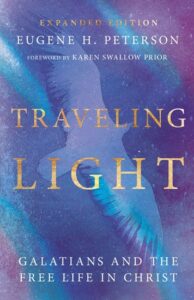 Traveling Light: Galatians and the Free Life in Christ Eugene Peterson (IVP) $25.00
Traveling Light: Galatians and the Free Life in Christ Eugene Peterson (IVP) $25.00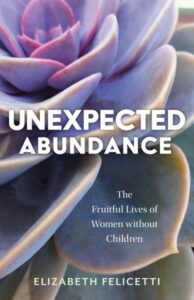 Unexpected Abundance: The Fruitful Lives of Women without Children Elizabeth Felicetti (Eerdmans) $16.99
Unexpected Abundance: The Fruitful Lives of Women without Children Elizabeth Felicetti (Eerdmans) $16.99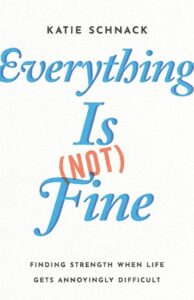 Everything Is (Not) Fine: Finding Strength When Life Gets Annoyingly Difficult Katie Schnack (IVP) $18.00
Everything Is (Not) Fine: Finding Strength When Life Gets Annoyingly Difficult Katie Schnack (IVP) $18.00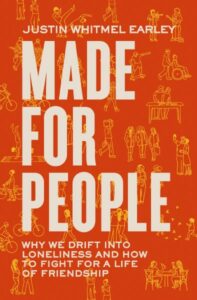 Made for People: Why We Drift Into Loneliness and How to Fight for a Life of Friendship Justin Whitmel Earley (Zondervan) $19.99
Made for People: Why We Drift Into Loneliness and How to Fight for a Life of Friendship Justin Whitmel Earley (Zondervan) $19.99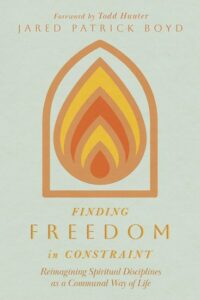 Finding Freedom in Constraint: Reimagining Spiritual Disciplines as a Communal Way of Life Jared Patrick Boyd (formatio / IVP) $20.00
Finding Freedom in Constraint: Reimagining Spiritual Disciplines as a Communal Way of Life Jared Patrick Boyd (formatio / IVP) $20.00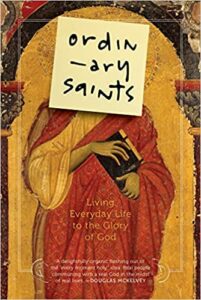 Ordinary Saints: Living Every Day to the Glory of God edited by Ned Bustard (Square Halo Books) $24.99 OUR SALE PRICE = $19.99
Ordinary Saints: Living Every Day to the Glory of God edited by Ned Bustard (Square Halo Books) $24.99 OUR SALE PRICE = $19.99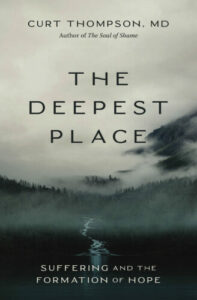 The Deepest Place: Suffering and the Formation of Hope
The Deepest Place: Suffering and the Formation of Hope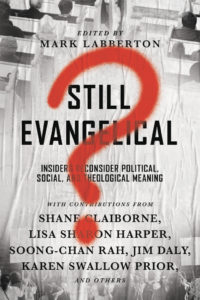 Of the several good ones exploring this territory, I recommended
Of the several good ones exploring this territory, I recommended 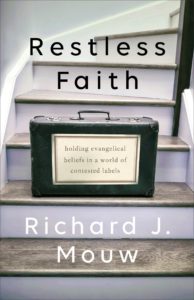 say enough about
say enough about 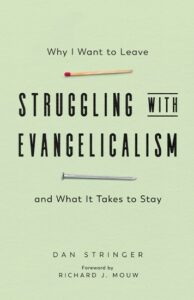 Struggling with Evangelicalism: Why I Want to Leave and What It Takes to Stay by Dan Stringer (IVP; $17.00 – our sale price = $13.60.) Richard Mouw wrote the forward to that one and his own mature ruminations are well worth reading, too — we’d love to send out some copies of his 2019 Restless Faith: Holding Evangelical Beliefs in a World of Contested Labels (Brazos Press; $22.00 – our sale price = $17.60.)
Struggling with Evangelicalism: Why I Want to Leave and What It Takes to Stay by Dan Stringer (IVP; $17.00 – our sale price = $13.60.) Richard Mouw wrote the forward to that one and his own mature ruminations are well worth reading, too — we’d love to send out some copies of his 2019 Restless Faith: Holding Evangelical Beliefs in a World of Contested Labels (Brazos Press; $22.00 – our sale price = $17.60.) Less personal, more scholarly, (and thicker, at 335 pages) but, again, nearly a must to understand the religious landscape of our lifetime, we recommend Evangelicals: Who They Have Been, Are Now, and Could Be edited by respected historians Mark Noll, David Bebbington and George Marsden (Eerdmans; $28.00 – our sale price = $22.40.) It’s a very carefully edited anthology with authors from Timothy Keller to Kristin Du Mez, Molly Worthen to Amanda Porterfield, Jemar Tisby to D.G. Hart, and many more.
Less personal, more scholarly, (and thicker, at 335 pages) but, again, nearly a must to understand the religious landscape of our lifetime, we recommend Evangelicals: Who They Have Been, Are Now, and Could Be edited by respected historians Mark Noll, David Bebbington and George Marsden (Eerdmans; $28.00 – our sale price = $22.40.) It’s a very carefully edited anthology with authors from Timothy Keller to Kristin Du Mez, Molly Worthen to Amanda Porterfield, Jemar Tisby to D.G. Hart, and many more. Losing Our Religion: An Altar Call for Evangelical Christianity Russell Moore (Sentinel) $29.00
Losing Our Religion: An Altar Call for Evangelical Christianity Russell Moore (Sentinel) $29.00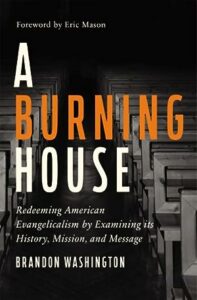 A Burning House: Redeeming American Evangelicalism by Examining Its History, Mission and Message Brandon Washington (Zondervan) $26.99
A Burning House: Redeeming American Evangelicalism by Examining Its History, Mission and Message Brandon Washington (Zondervan) $26.99 The Evangelical Imagination: How Stories, Images, & Metaphors Created a Culture in Crisis Karen Swallow Prior (Brazos Press) $26.99
The Evangelical Imagination: How Stories, Images, & Metaphors Created a Culture in Crisis Karen Swallow Prior (Brazos Press) $26.99